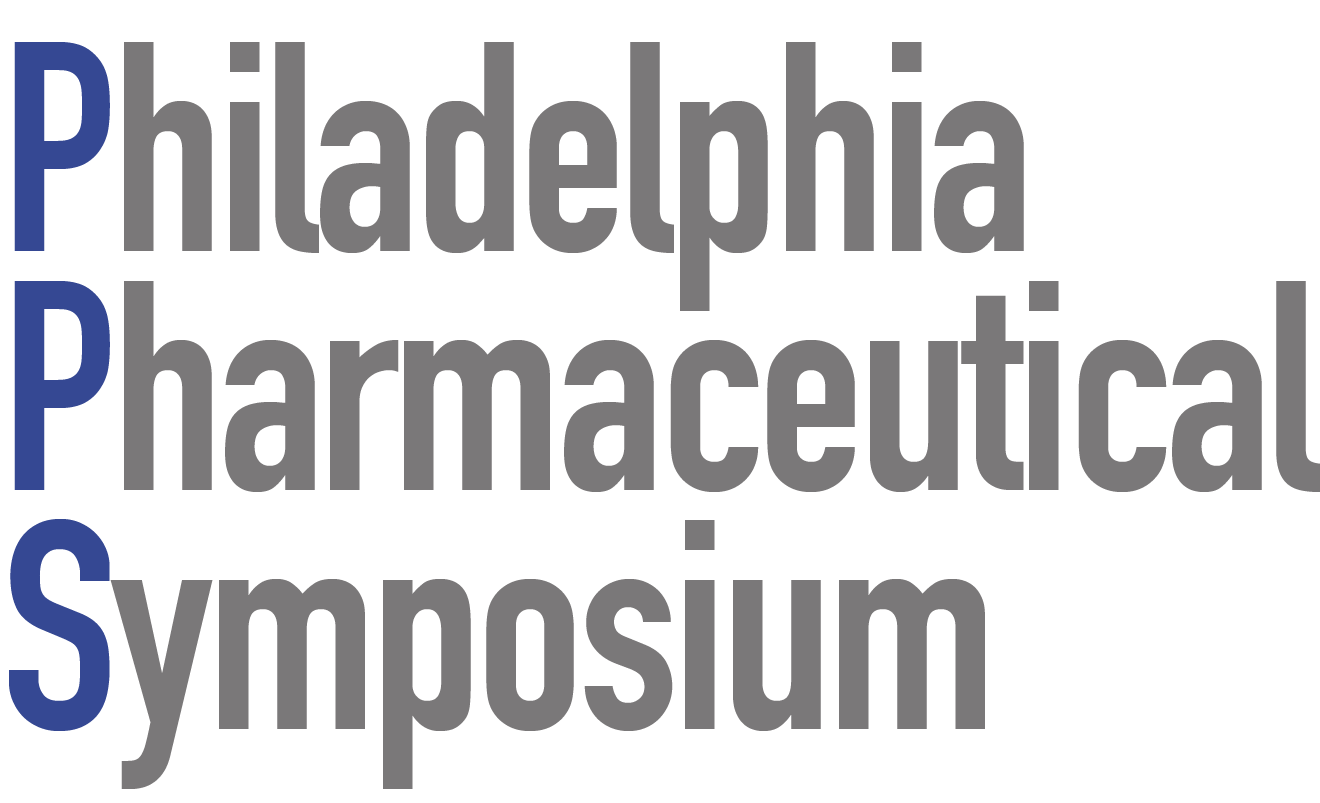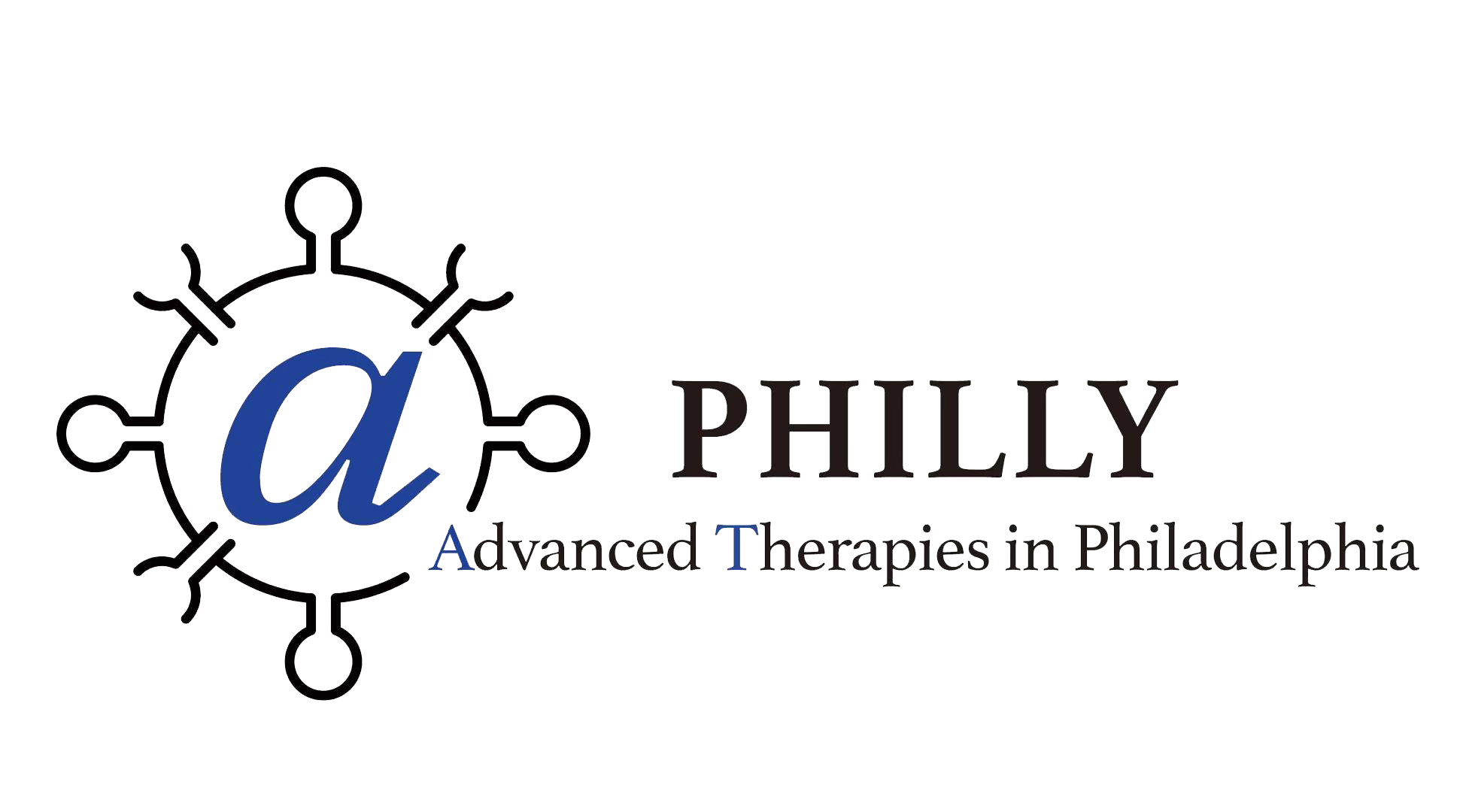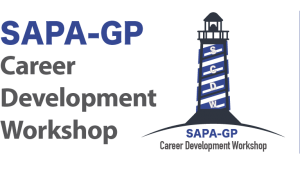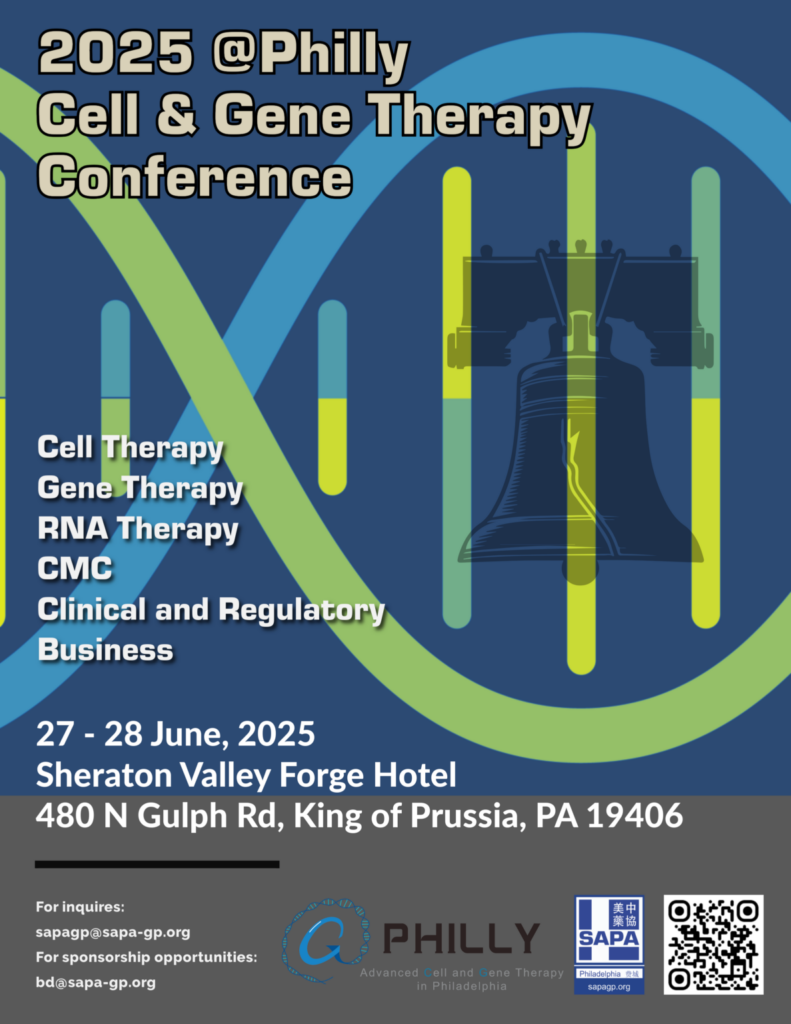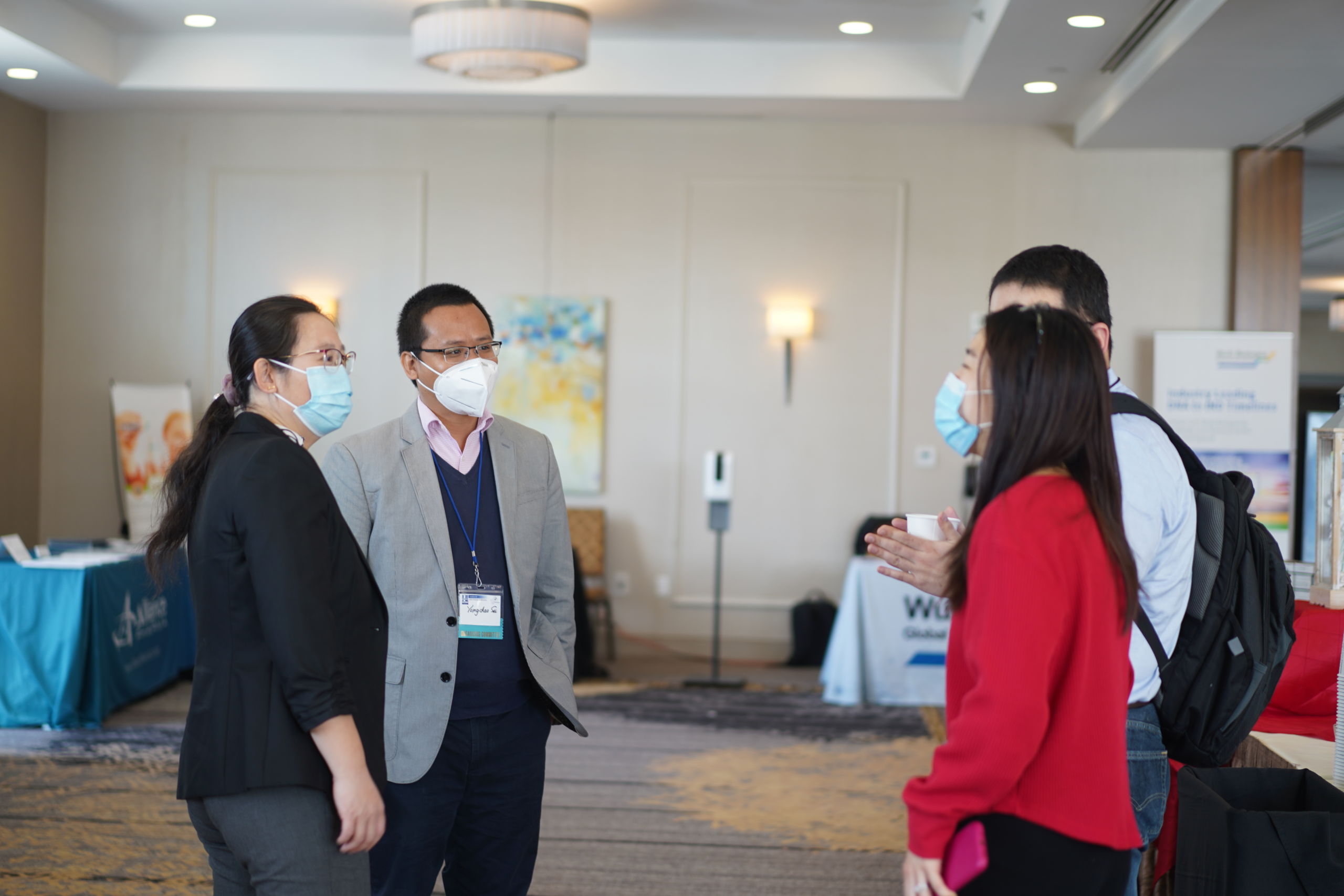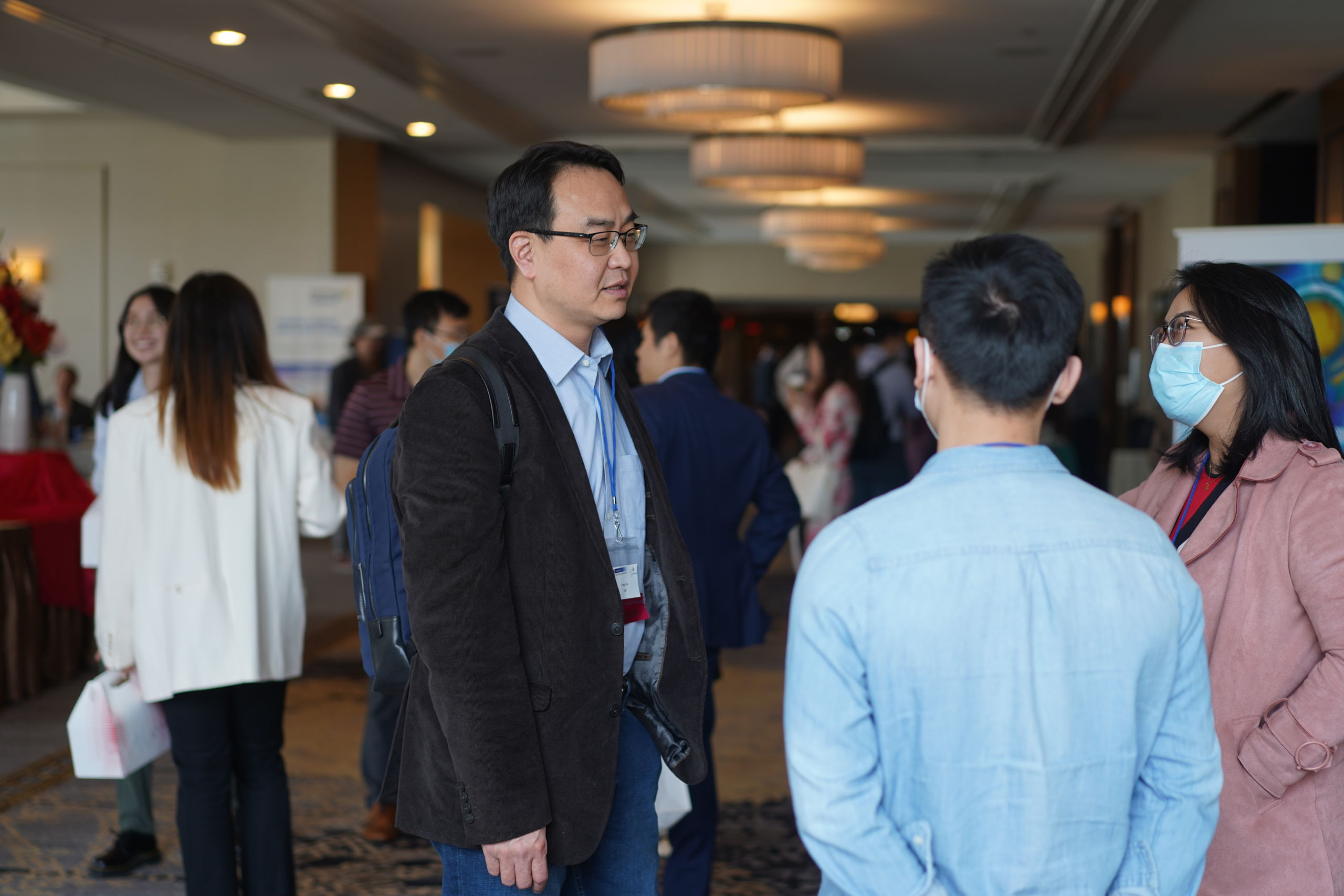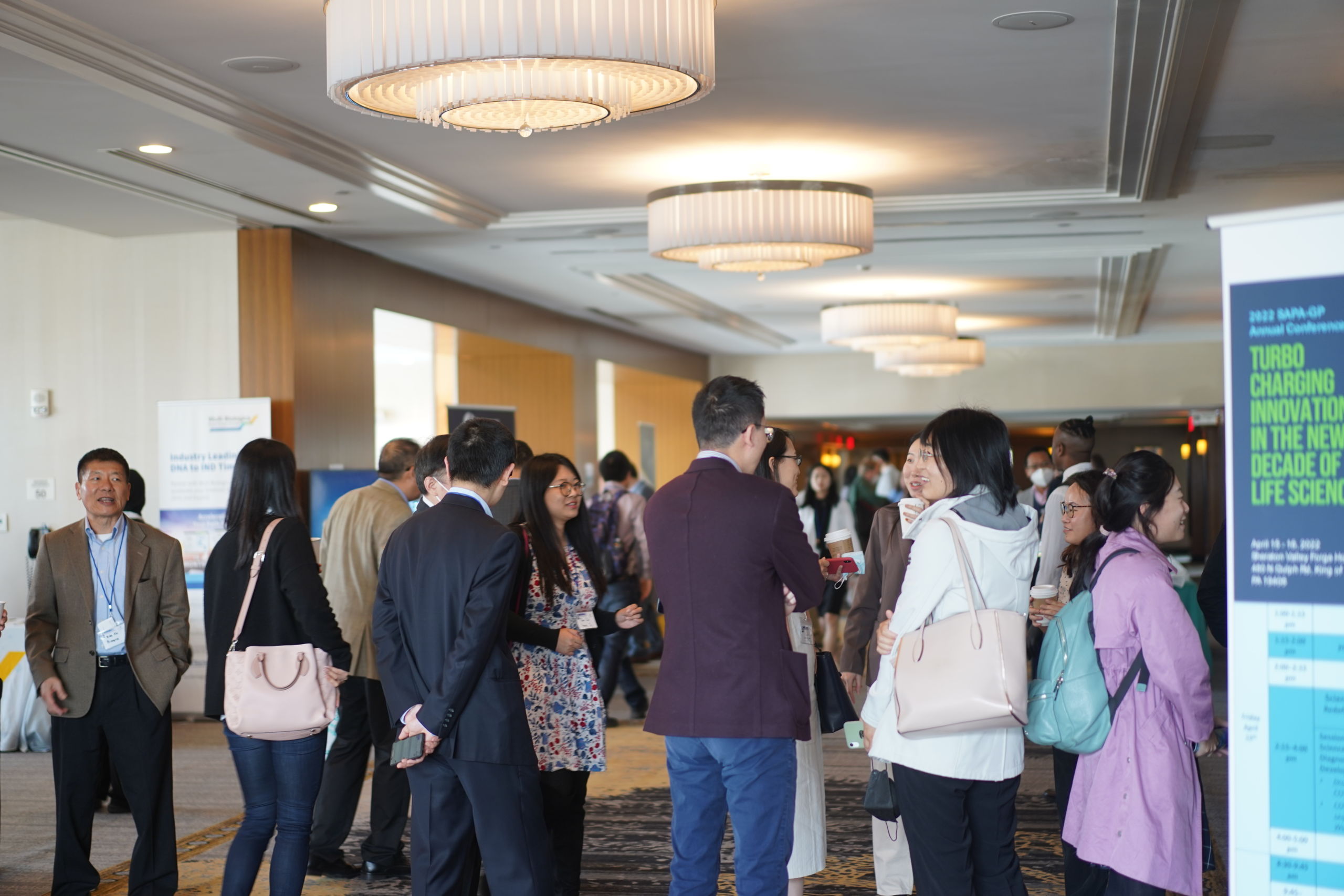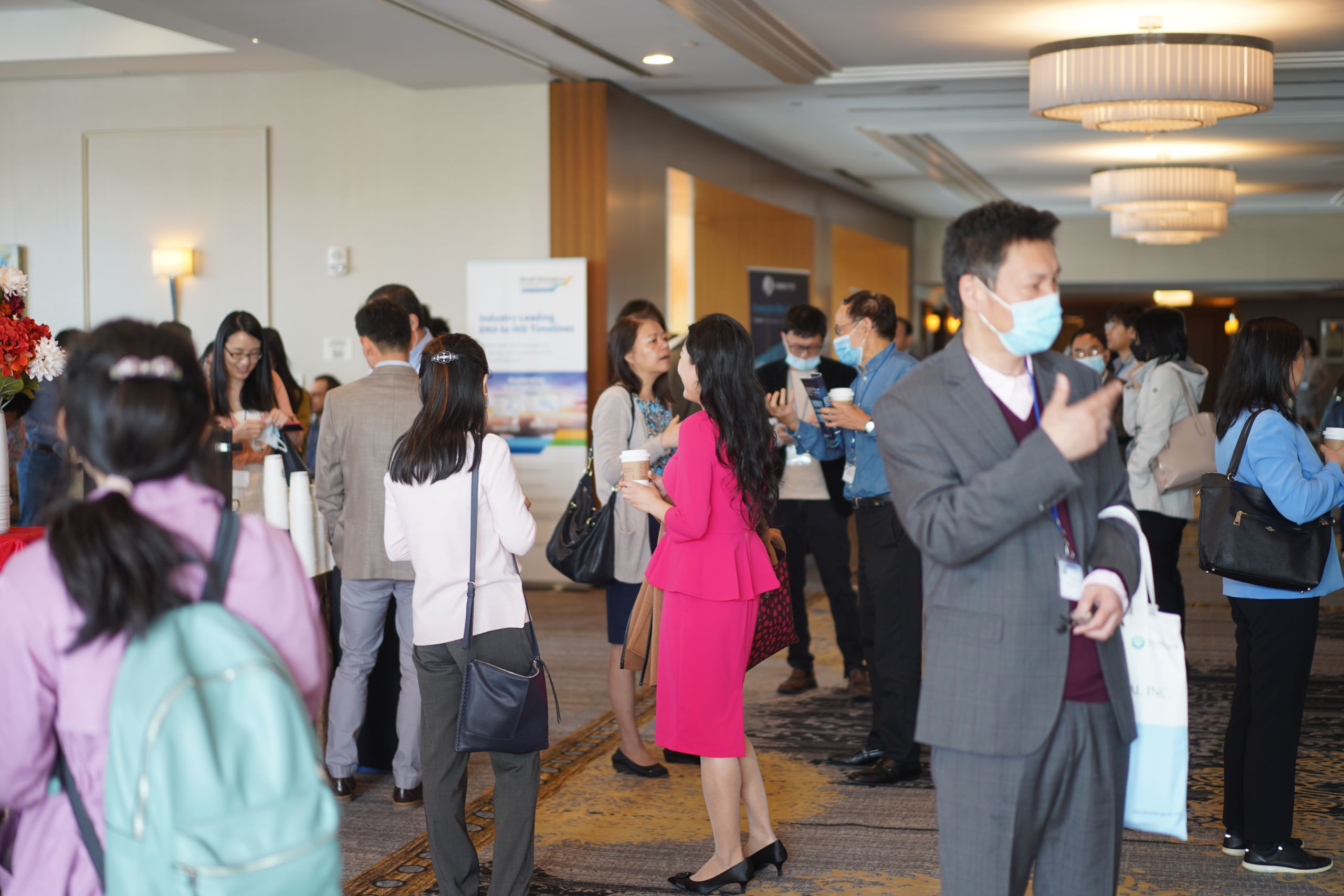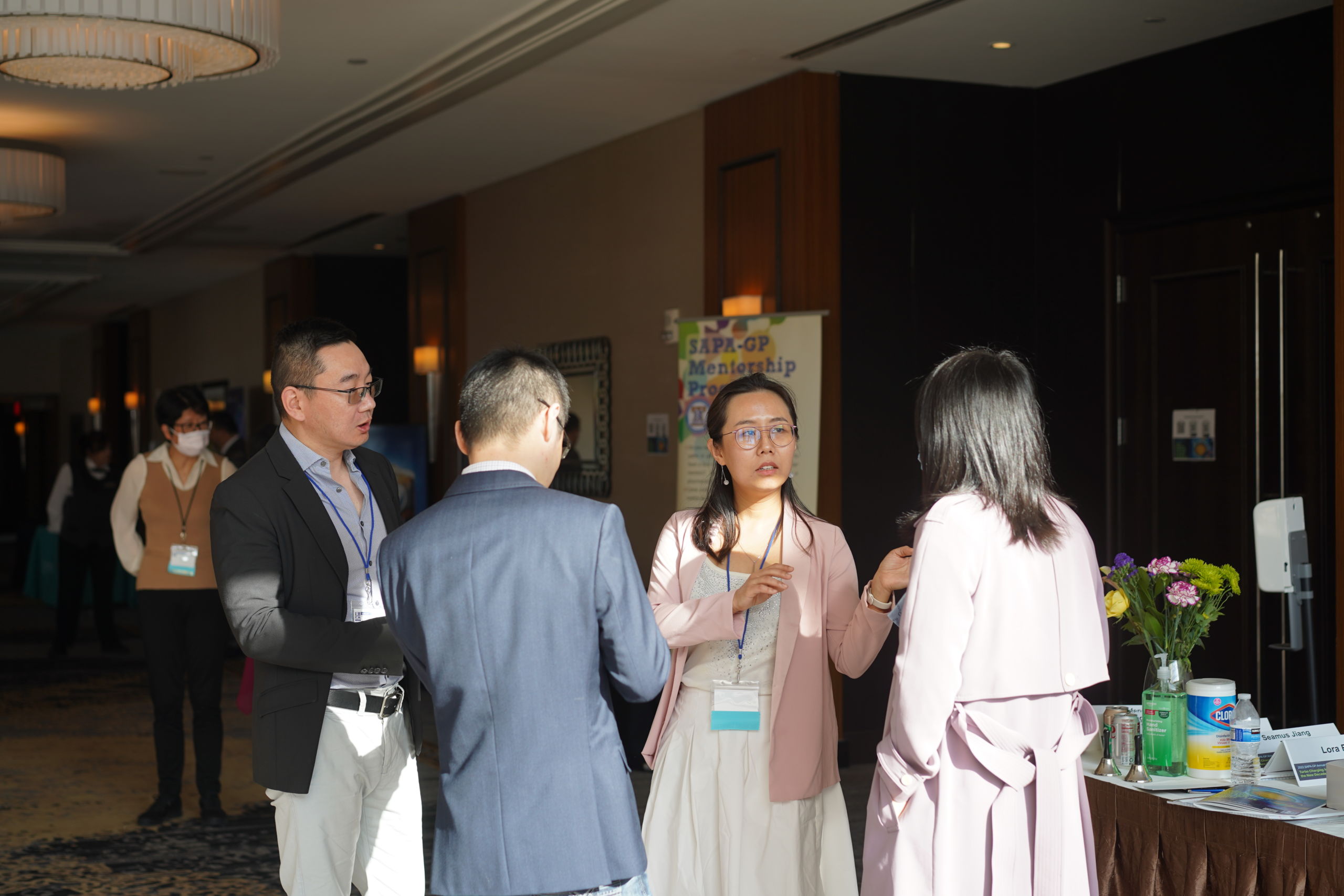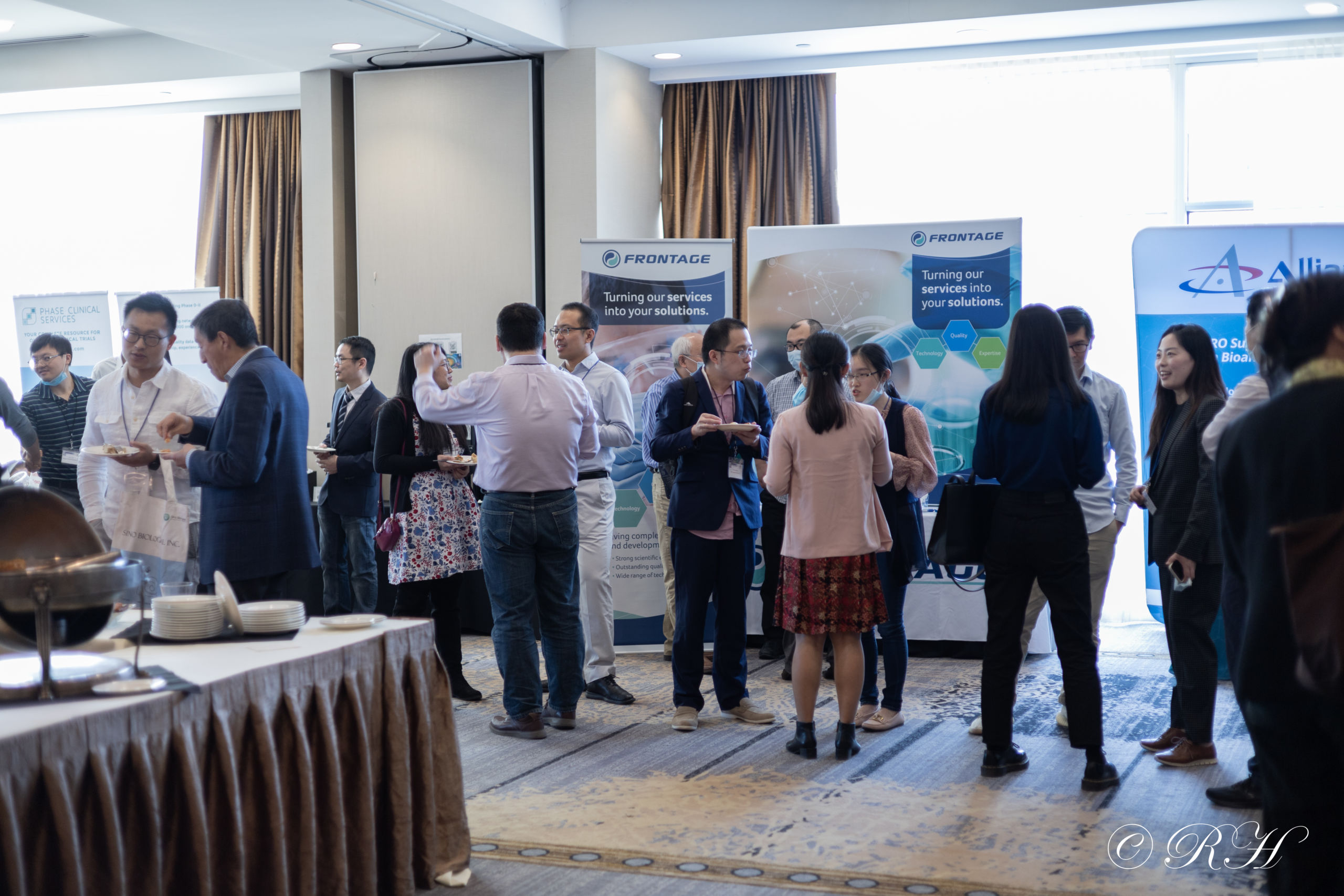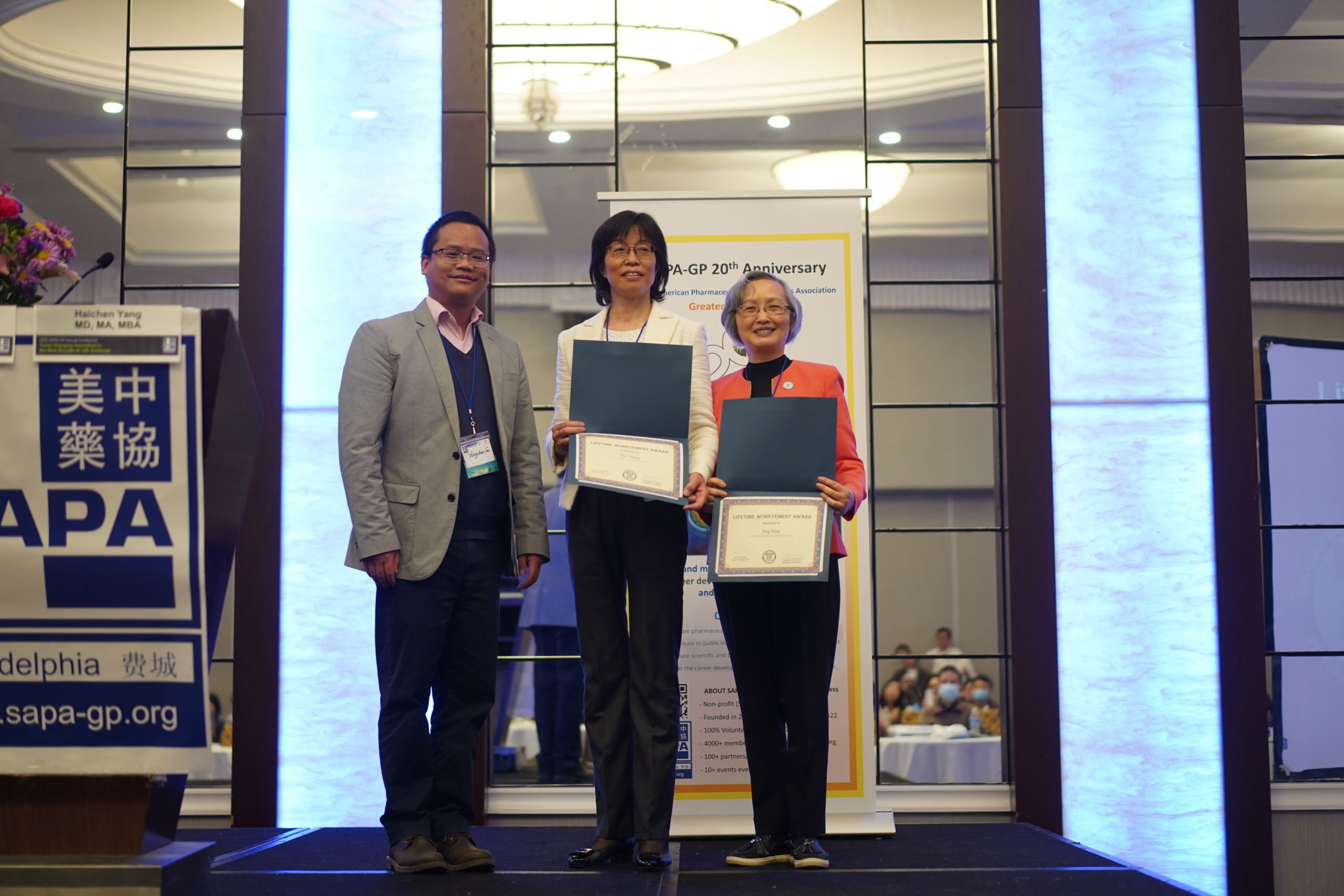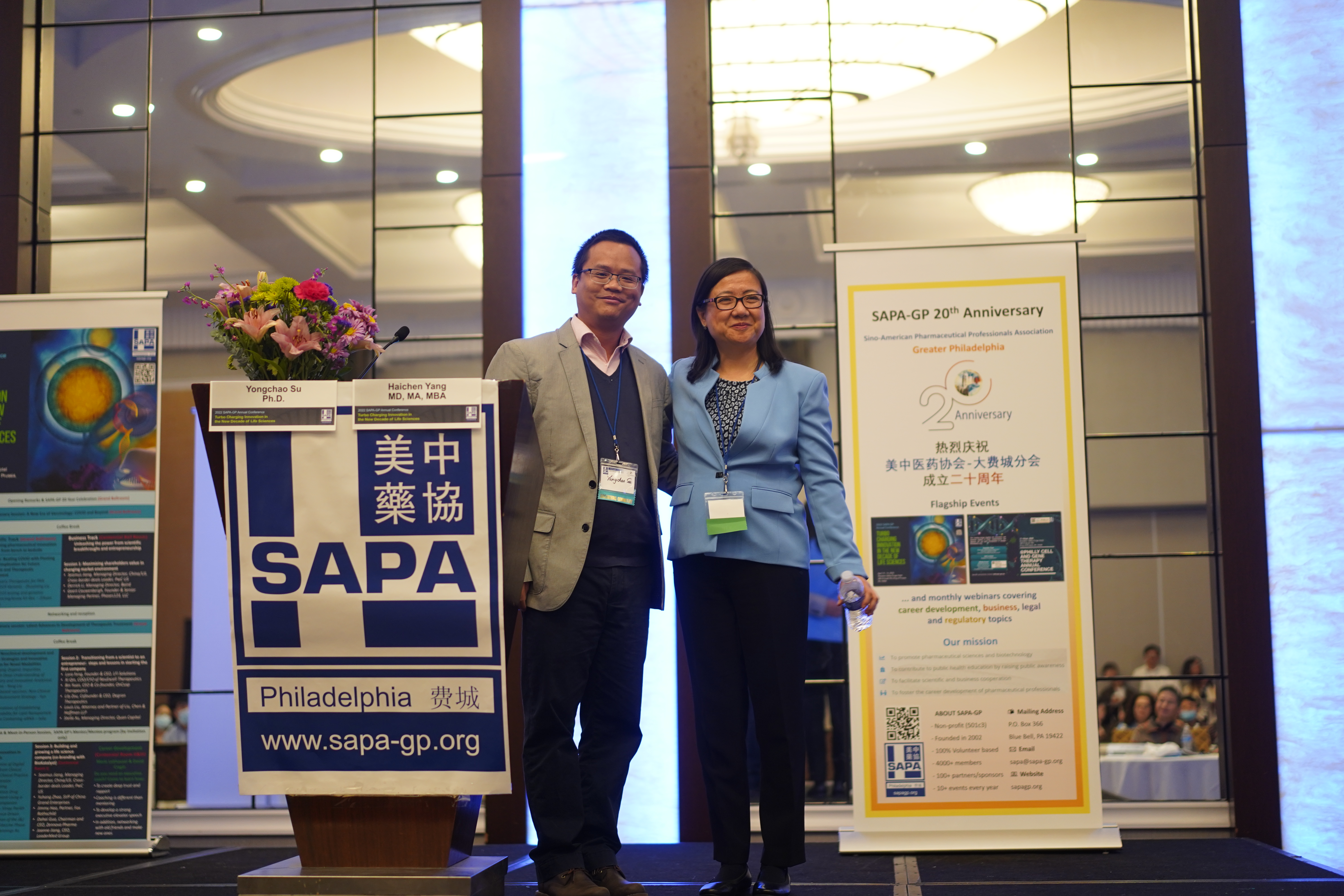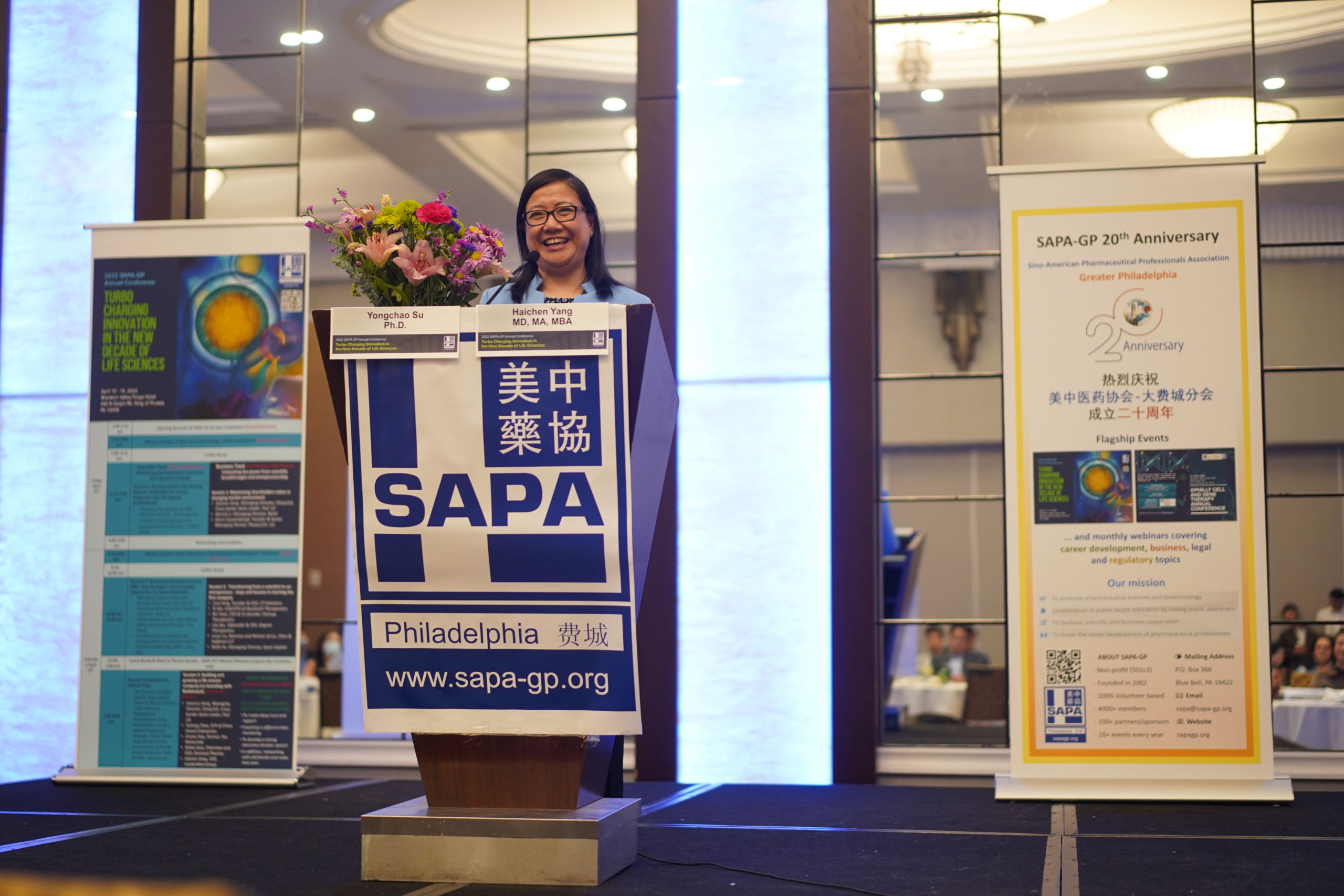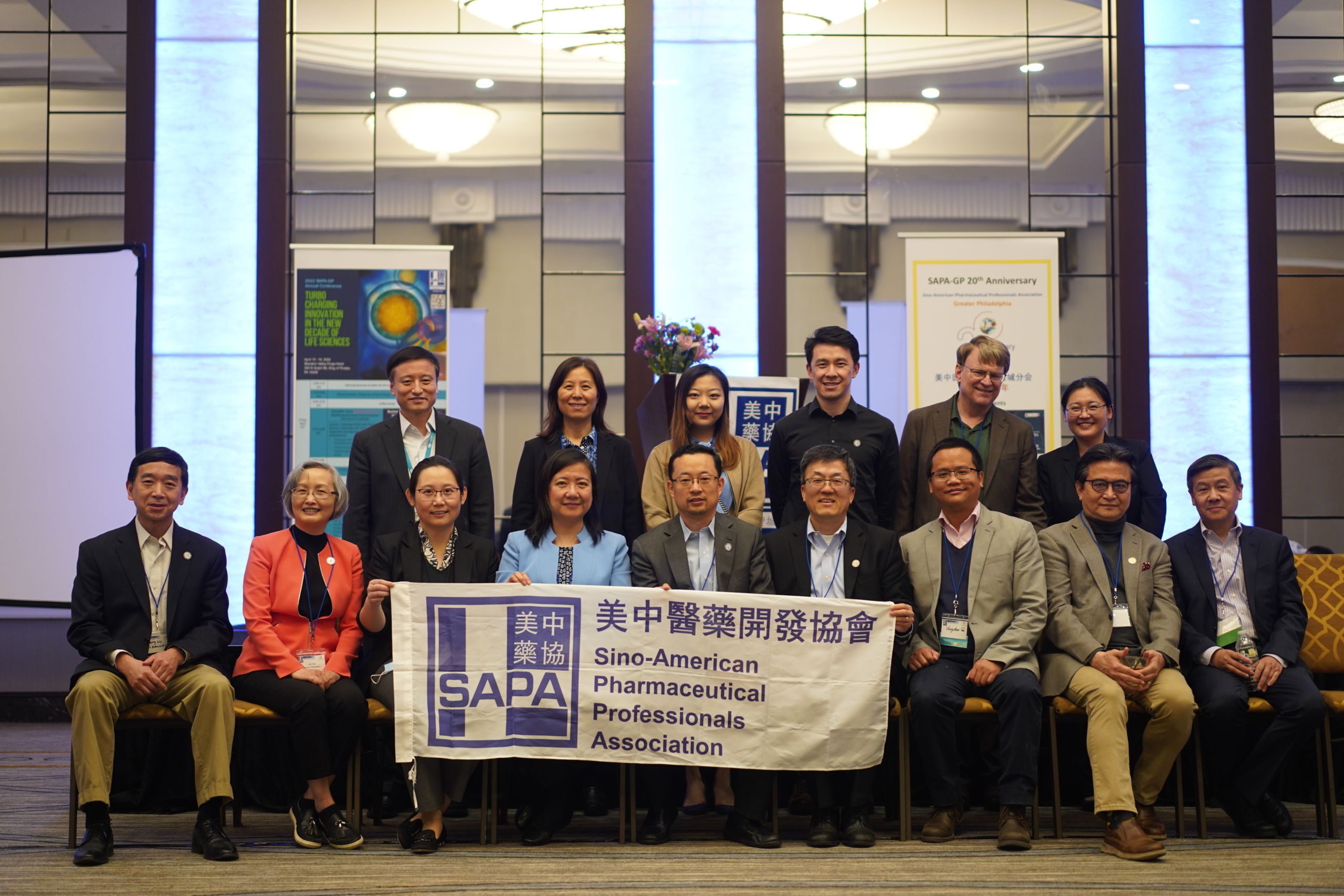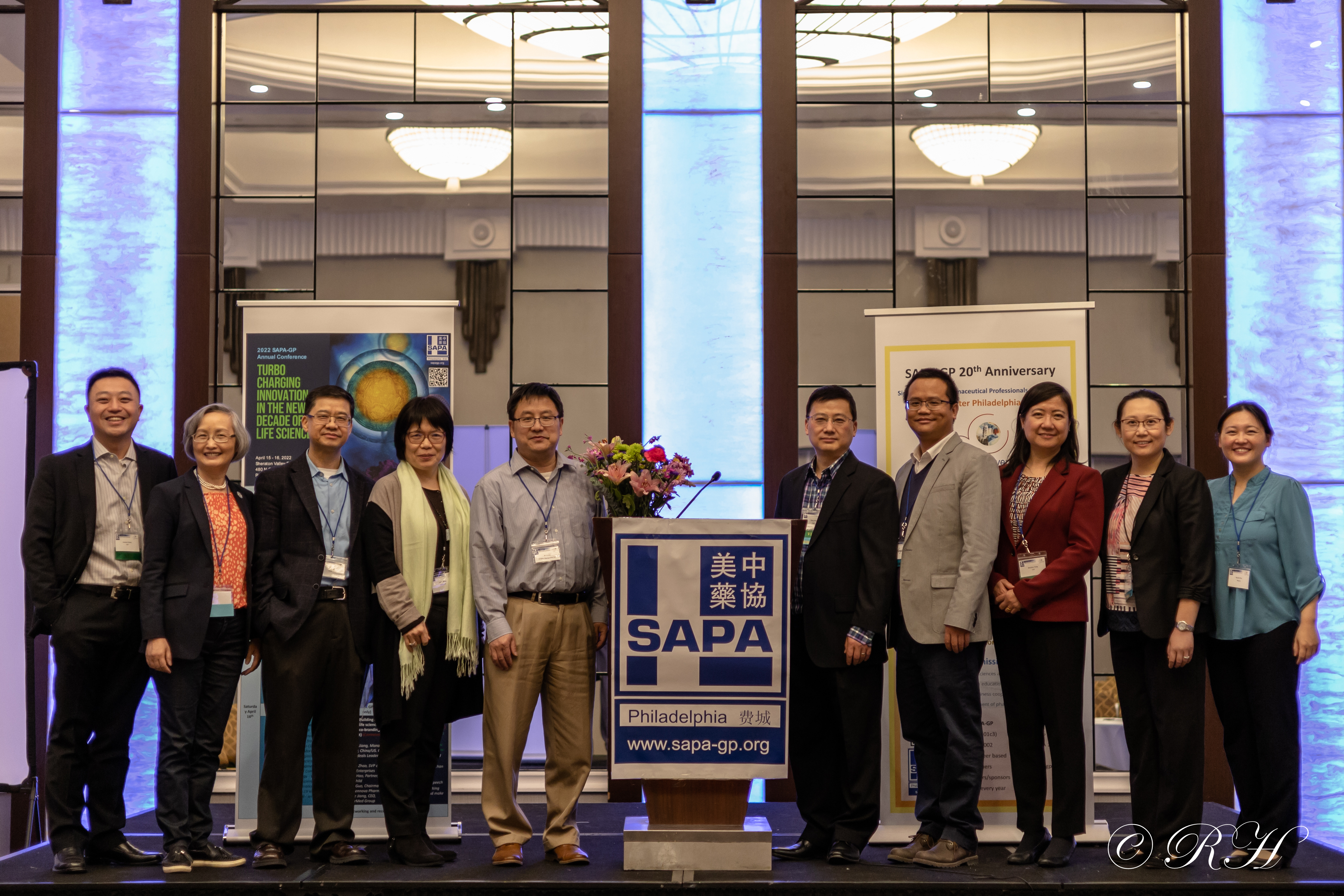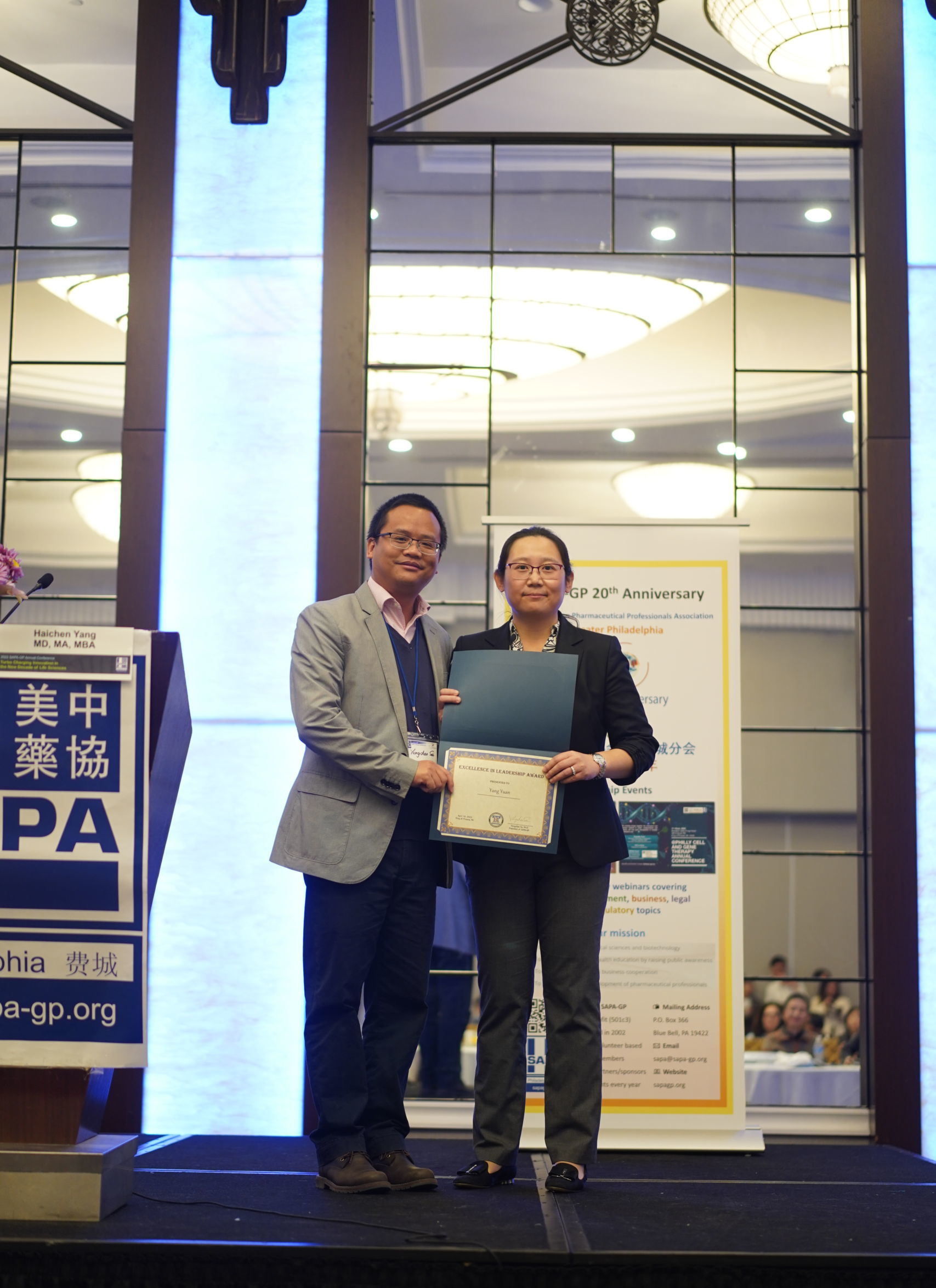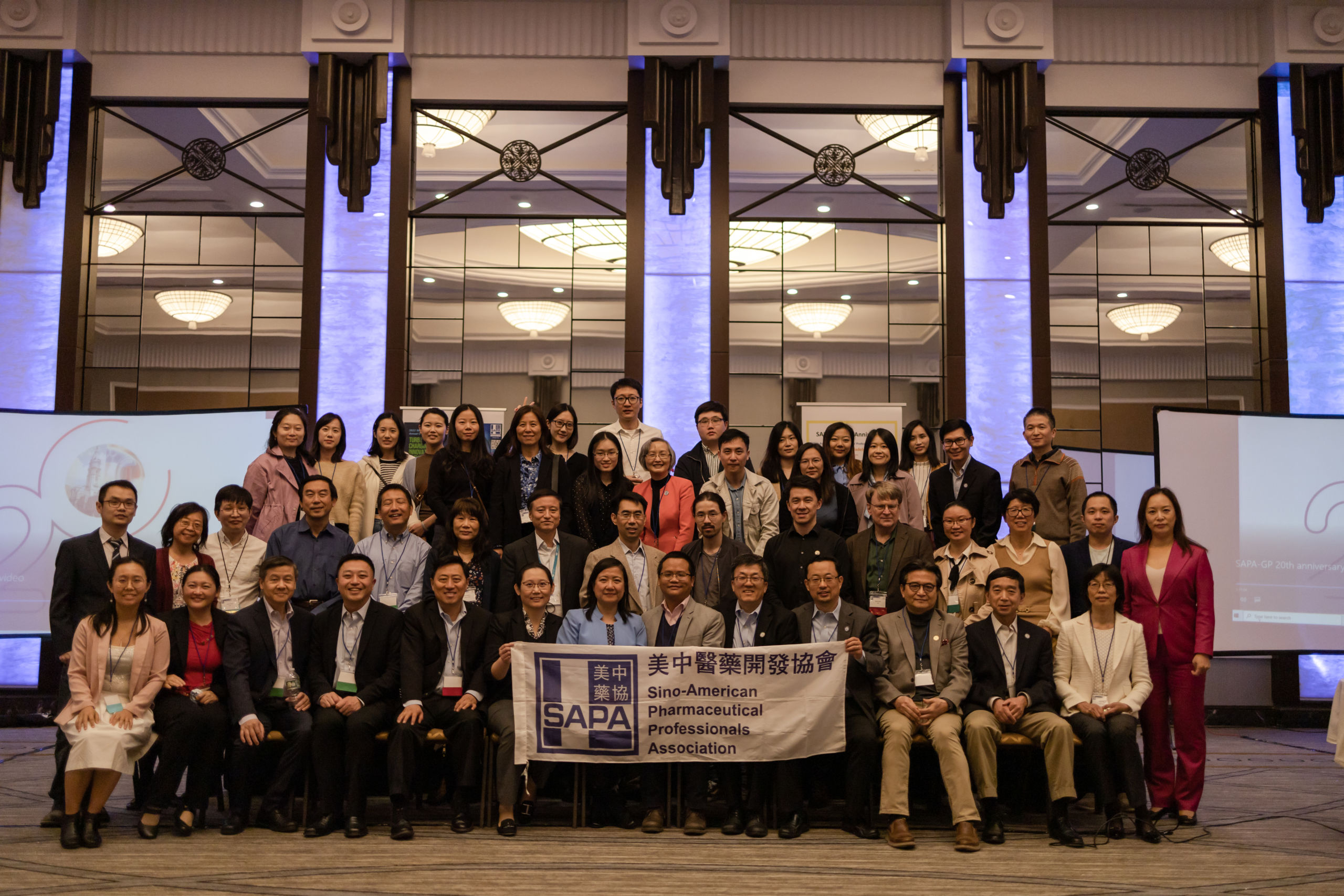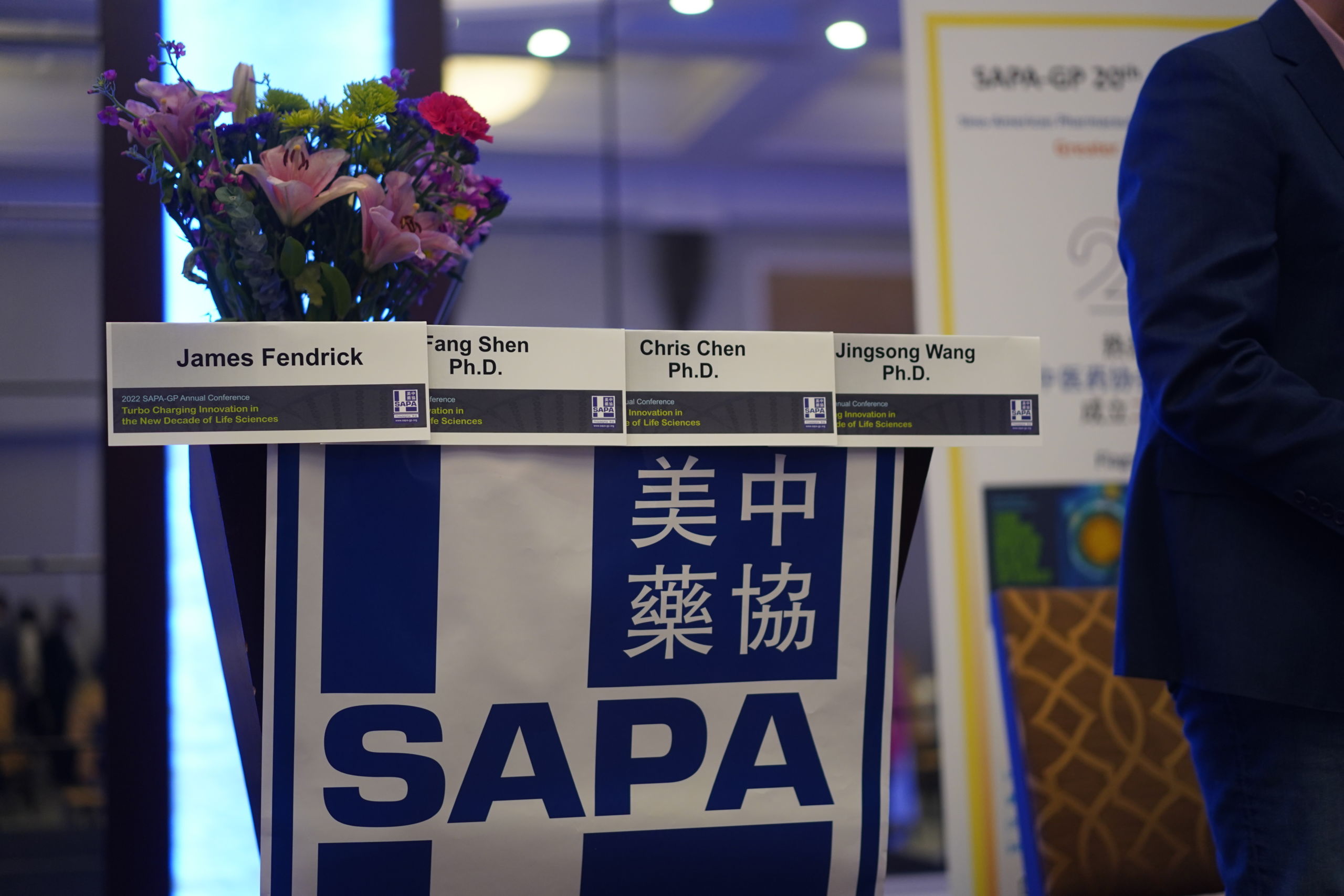From April 15 to April 16, 2022, Sino-American Pharmaceutical Professional Association – Greater Philadelphia (SAPA-GP) held its annual conference at Sheraton Valley Forge Hotel, King of Prussia, PA. This is the first in-person event of SAPA since the breakout of the COVID-19 pandemic and is also the celebration of the 20th anniversary of SAPA-GP. It is a much delightful and invigorating moment for more than 300 participants at the conference.
The conference lasted one and a half days both virtually and onsite. In addition to the keynote speech in the plenary session, the three parallel sessions titled “Scientific Track,” “Business Track,” and “Career Development” were held to best accommodate the different focuses and preferences of the audience.
Opening remarks & SAPA-GP 20 years celebration
Dr. Yang Yuan (2023-2024 President-elect) announced the opening of the 2022 SAPA-GP Annual Conference and went through the 20 years achievements of SAPA-GP with a memorial video.
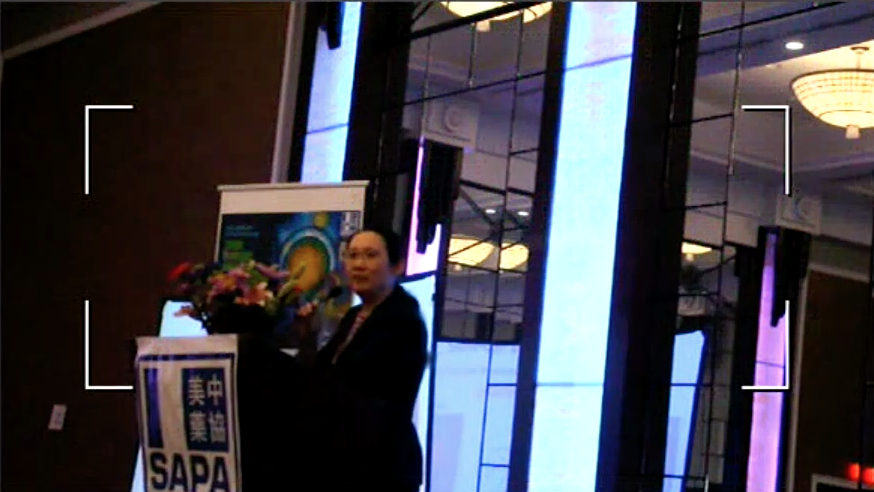
April 15, Keynote Speech — A New Era of Vaccinology: COVID and Beyond
Dr. Lu Shan, a professor at University of Massachusetts Medical School, started the speech with an introduction of the historical development of vaccines. From such a historical pointed view, according to Dr. Lu, the recent progress of COVID-19 vaccine development achieved as a global effort has been quite remarkable and unprecedented. Within just one year or so, various types of COVID-19 vaccine — especially the highly effective RNA vaccines — have been approved and put to wide use at a global scale. Such a remarkable achievement, however, could also mean that the COVID-19 virus is an easy target for vaccine development, such that an overly euphoric outlook on the future development of RNA vaccines is unwarranted. Instead, the maintenance of vaccine effectiveness over time and against newly evolved virus variants, as well as the safety of vaccines, remains issues yet to be addressed. Finally, as an expert in vaccine development, Dr. Lu offered his own proposals on the maximization of COVID-19 vaccine protection for individuals, and introduced his research team’s recent work progress on a novel DNA and protein combination COVID-19 vaccine.
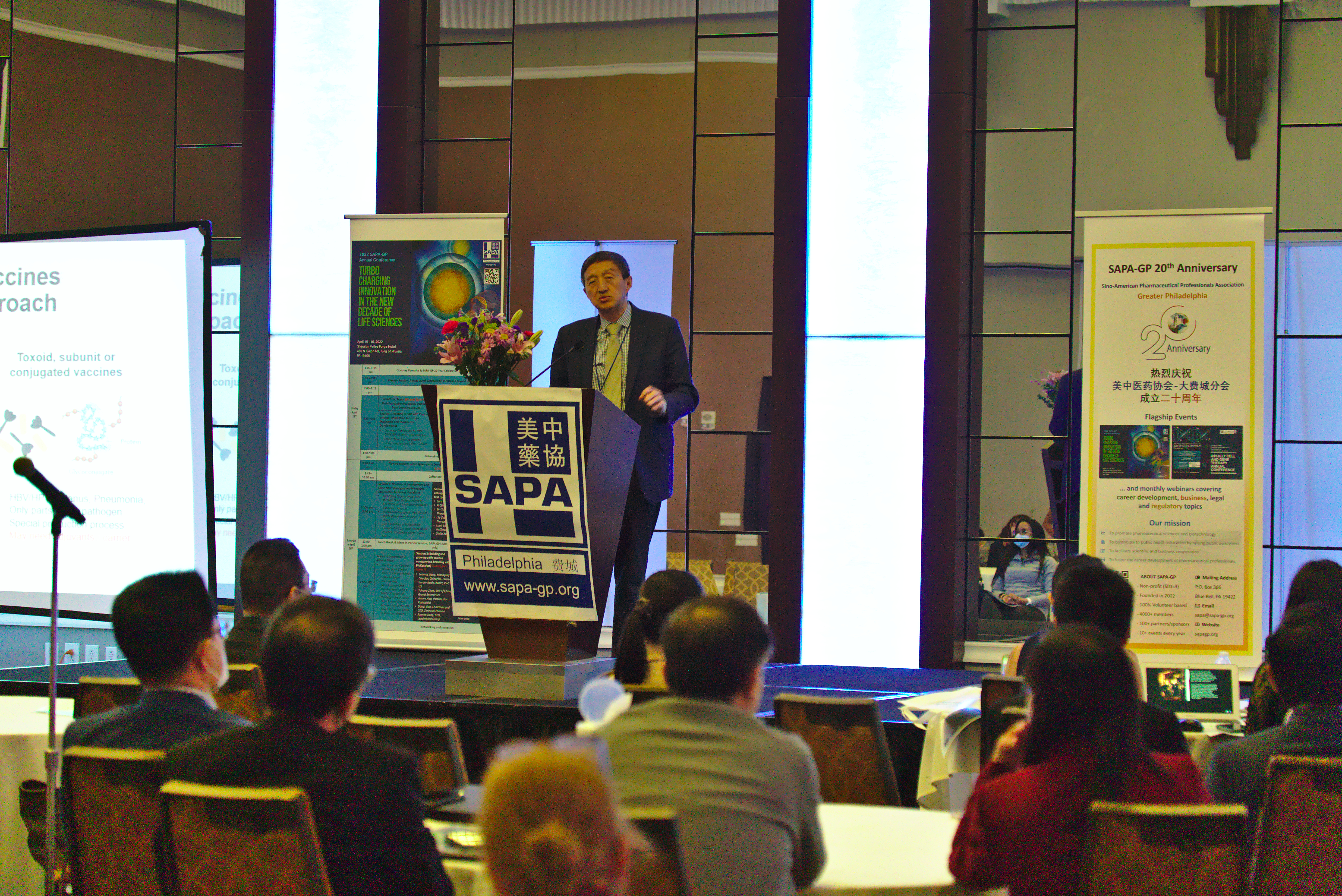
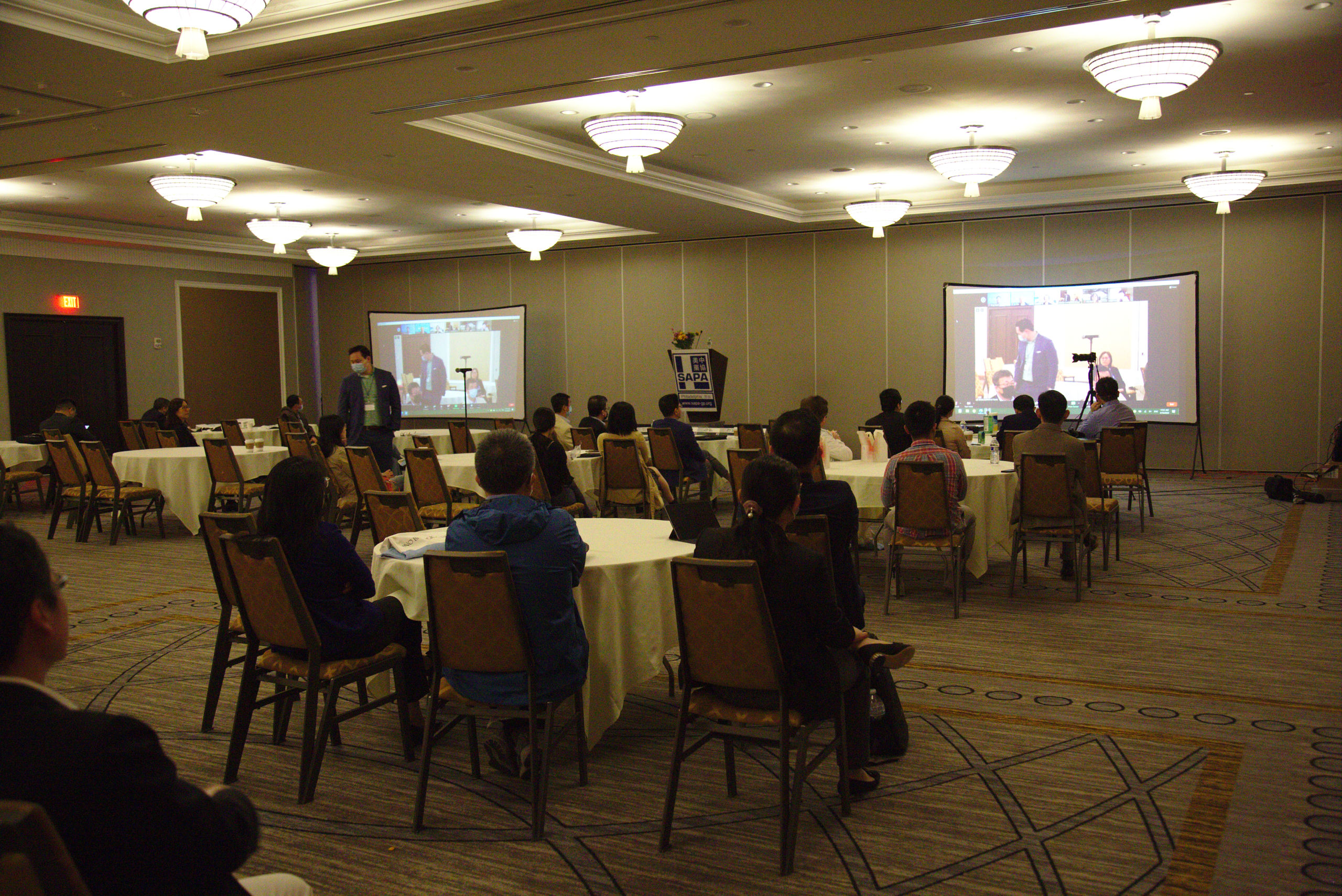

April 15, Parallel Sessions
April 15, Scientific Track — Redefining Pharmaceutical Innovation: from Bench to Bedside
Dr. Zhuoming Liu, a professor at Washington University in St. Louis, discussed his team’s cutting-edge research on developing neutralizing antibodies that can target a broad range of COVID-19 variants. Dr. Zhuoming Liu’s work began with the establishment of a proprietary techonology platform that is used to study escape variants of COVID-19 and their pathology. With this platform, Dr. Zhuoming Liu’s team is able to develop antibody cocktail therapies against COVID-19 and methods for selecting such antibodies. Among the neutralizing antibodies developed by his team, several have shown effectiveness against major escape variants of COVID-19.
Prof. Zi-Xuan Wang began her speech by recounting the time of her last normal days before the pandemic began on March, 8, 2020, and how the situation changed rapidly and influenced everyone around the world, which led to a change of the main focus of her work. During the pandemic, academic medical centers like Thomas Jefferson University were under huge pressure to complete a massive amount of COVID-19 tests within limited time. To meet these challenges, her team undertook great endeavors and developed Jefferson Extraction-Free PCR Assay for COVID-19 testing, which has similar assay sensitivity with the commonly used cobas 6800 SARS-CoV-2 PCR Assay. With such experience, she shared her thoughts and lessons learnt from the pandemic that would help us getting prepared for future pandemics.
April 15, Business Track — Unleashing the Power from Scientific Breakthroughs and Entrepreneurship (Co-branding with BioKatalyst)
Derrick Li, a Managing Director at Baird & Co., discussed the recent situation of the investment market for biopharma-related industries. He pointed that, with the gradual fading of the market fervor with COVID-related investment targets that emerged at the early stage of the pandemic, as well as the uncertainties caused by recent global political and economic situations, the investments toward biopharma-related industries are overall at a low level. With that, Mr. Li offered his own predictions of the investment market for biopharma-related industries in the near future.
After that, Mr. Li and Dr. Geert Cauwenbergh (the founder of Phases123 LLC) joined a panel discussion hosted by Seamus Jiang, a Managing Director at PwC US. Dr. Geert Cauwenbergh has been an old friend of SAPA. He pointed out, just like many other industries, the biopharma industry can be cyclical, such that the current market condition should be viewed with a long-term perspective.
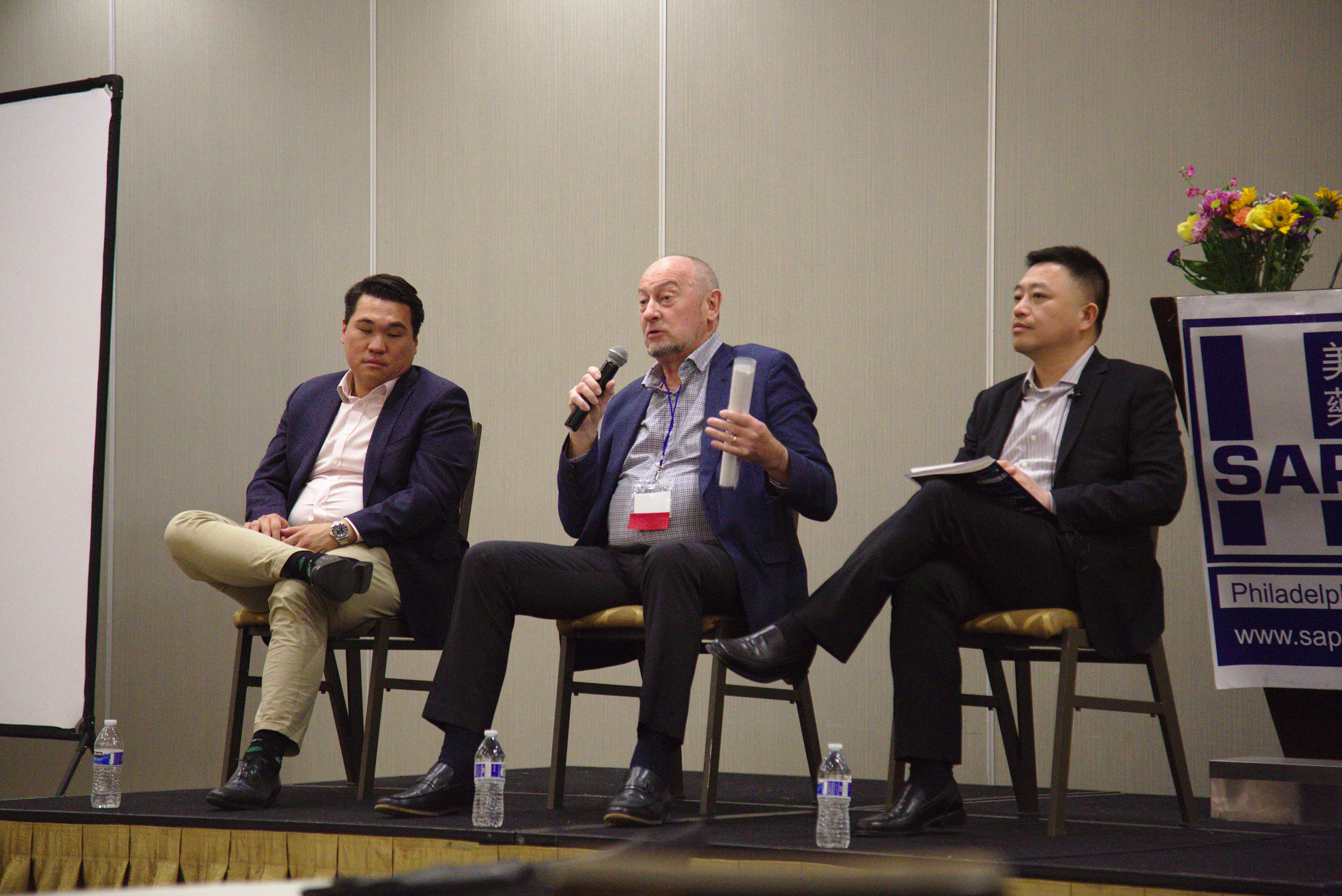
April 16, Keynote Speech — Latest Advances in Development of Therapeutic Treatment
Dr. Jingsong Wang, the founder and CEO of Harbour BioMed, is also a former president of SAPA. He attended the conference by video from China. Dr. Wang discussed the recent progress of his company’s development of next-generation cancer immunotherapies. By working with various industrial and academic partners, Harbour BioMed has established its proprietary Platform HBICE™, for the development of human Heavy chain only antibody (HCAb) Based Immune Cell Engager, which constitutes stable multi-specific antibodies with different geometries. With several core technological platforms, Harbour BioMed has built up a rich pipeline with drug candidates with the potential of becoming the “first-in-class” or “best-in-class.”
Dr. Chris Chen, the CEO of WuXi Biologics, also joined the conference by video from China. He summarized the remarkable progress that WuXi Biologics accomplished in the global fight against COVID-19. Adopting a risk-controlled approach, WuXi Biologics with its robust CMC and cell line development platforms greatly accelerated the process from DNA to IND and from IND to EUA.
After that, Dr. Jingsong Wang, Dr. Chris Chen, and Mr. James Fendrick, who attended the conference on-site as the president of Rockland Immunochemicals, joined a panel discussion hosted by Dr. Fang Shen, who is a former president of SAPA and a vice president at Immunome. Mr. James Fendrick has nearly thirty years of experience in the antibody drug development and nearly ten years of engage with SAPA. He firmly believes that the global cooperation in the biopharma industry is dispensable and benefits the entire humankind, which is a critical message he wishes to convey via SAPA.
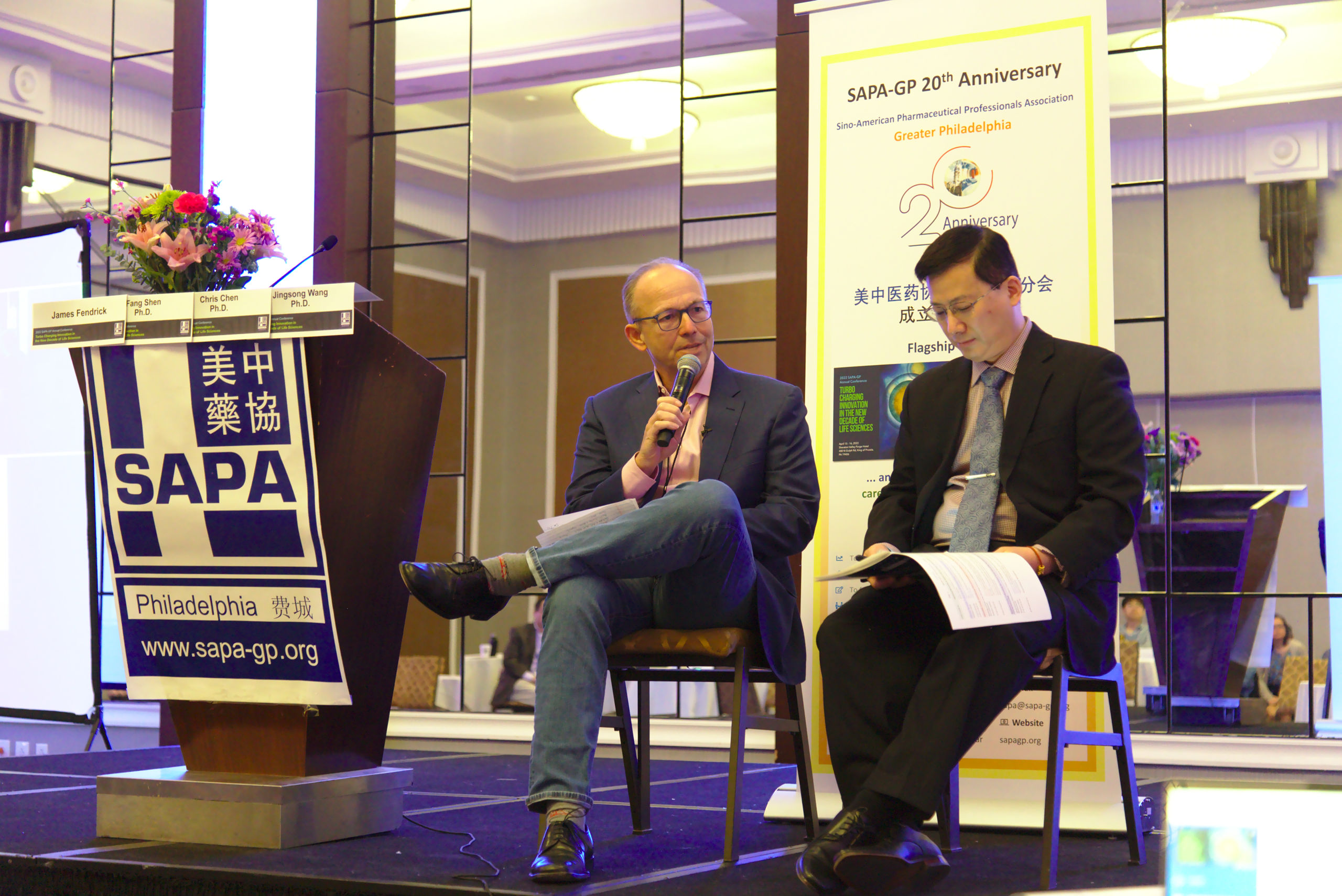
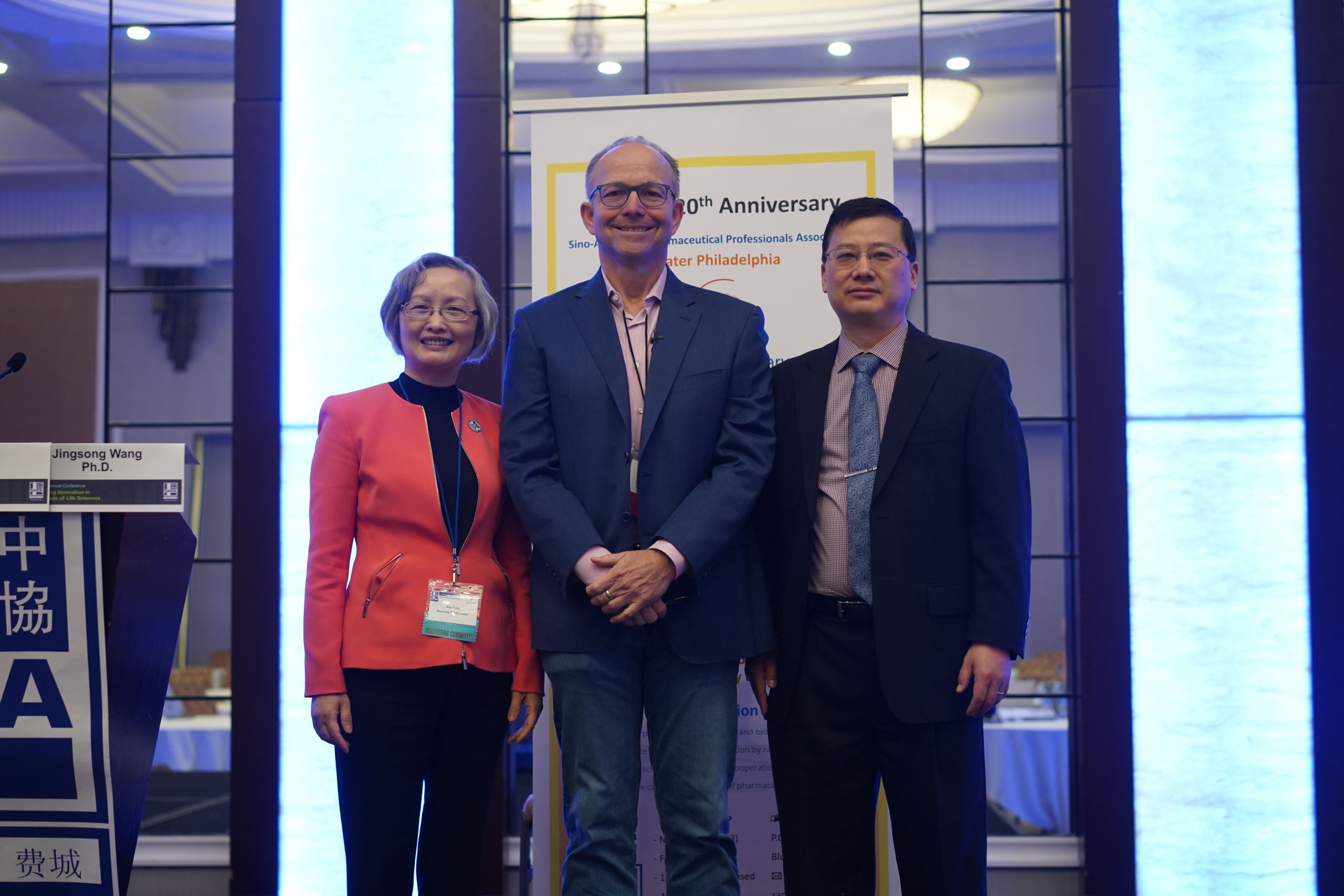
April 16, Parallel Sessions
Morning, April 16, Scientific Track — Redefining Pharmaceutical Innovation: from Bench to Bedside
The morning scientific track session was kicked off by a speech of Dr. Yong Liu, a Senior Principal Scientist in the Division of Analytical Research & Development at Merck Research Laboratories. His talk focused on using innovative analytical methods to manage the organic impurity issue during drug development, demonstrated by case studies of API-1, nitrosamine. He also shared a novel analytical method recently developed by his group on LNP characterization. In the Q&A section, many in the audience were interested in different novel methodologies and discussed their applications in practical use with Dr. Liu.
The second speaker, Dr. Yun Zhang from Pfizer shared his experience and insights of non-clinical safety assessment strategy of mRNA-based vaccines. Dr. Zhang first introduced the mechanisms of action for traditional vaccines and long development process which may take up to 10-20 years before the final approval. He then reviewed the characteristics, mechanism, development process, and safety concerns of this new modality, the mRNA-based vaccine. In Pfizer’s COVID-19 mRNA vaccine safety assessment, the Antibody Dependent Enhancement (ADE) effect has been closely monitored, and preclinical study in non-human primates did not show any evidence of ADE effect. Dr. Zhang also discussed in detail the design of non-clinical toxicity study assessing immunogenicity using monkey as the model. Additionally, the standard GLP repeat-dose toxicity and DART studies in rats were conducted and there were no adverse toxicity findings, and no developmental and reproductive toxicity including fertility and pregnancy.
The last speaker in the morning session is Dr. Julia Gao from Bristol Myers Squibb. Her talk focused on the novel Lipid Nanoparticle (LNP) drug delivery system containing siRNA. Dr. Gao discussed two case studies of the siRNA-LNP product development and comparability assessment plan when transitioning from early stage to late stage clinical trial. In one case study upon transitioning from the phase 2 to the phase 3 clinical trial, Dr. Gao’s team proposed a framework containing four different tiers of Pharmaceutical and non-clinical comparability assessment for a new LNP product that has been modified in the manufacturing process from phase 2 to phase 3. This framework received positive feedback from both FDA and EMA. Another case study involved a siRNA-LNP product, Onpattro from Alnylam which targets a rare genetic disorder; the study went through similar assessment process and has been successfully approved as an orphan drug. After her talk, the audience and the fellow speaker Dr. Liu had a good exchange on BA/BE related topics with Dr. Gao.

Morning, April 16, Business Track — Unleashing the Power from Scientific Breakthroughs and Entrepreneurship
In a virtual panel discussion hosted by Ms. Lora Feng, Founder and CEO of LFI Solutions, five panelists shared with the audience their career transition from a scientist to an entrepreneur and their experience in early-stage innovation. LFI Solutions is a managing consulting firm specializing in cross border business development and transactions in the life science industry
Dr. Bing Yuan, Co-founder and CEO of Oncusp Therapeutics, introduced the three-step process business model Oncusp that aims to the develop “top 3 in class” drugs: (1) in-license of global IP rights of drug candidates; (2) clinical proof of concept development; and (3) out-license of the IP rights to Big Pharmas for the eventual commercialization.
Dr. Lily Zou is now the CEO of Degron Therapeutics. She co-founded the company with Dr. Yong Cang, a professor at ShanghaiTech University. They worked together to develop the company’s proprietary technological platform “Molecular Glue Degrader” to develop drug candidates that function by facilitating intracellular degradation of target proteins via ubiquitin ligases. With this platform, they discovered novel disease targets that are otherwise “undruggable” to traditional small molecule inhibitors. Degron Therapeutics sets a good example of cooperation between a scientist and an entrepreneur.
Mr. Xi Qin is currently COO and CFO of NeuExcell Therapeutics, an early-stage innovator on gene therapy. Previously, he served as COO and CFO of GENEWIZ for ten years, during which he led the company in achieving various milestones. In 2018, GENEWIZ was acquired for $450 million. Mr. Xi Qin continued his journey of a startup entrepreneur after this success story. Mr. Xi Qin believes that a startup founder should focus on value creation instead of control, trust and empower the team, and hold the team accountable.
Mr. Louis Liu is an experience lawyer in private equity and M&A. Many of his clients are startup companies, for which the proper handling of legal issues is vital. Mr. Louis Liu offered several suggestions on how a startup founder should interact with lawyers: a founder should avoid both DIY on legal issues and blind reliance on lawyers; instead, a founder should try to understand the law and actively engage with the lawyer in drafting legal documents. Mr. Louis Liu also gave suggestions on how to find a good lawyer for startup founders.
Dr. Stella Xu is Co-founder and Managing Director of Quan Capital, a premier VC investor of early and growth stage biopharma innovators in China and the world. Among the companies invested by Quan Capital, several have achieved successful exit. Based on these success stories, Dr. Stella Xu discussed her understandings of the factors that make a successful startup company and her criteria in selecting investment targets.
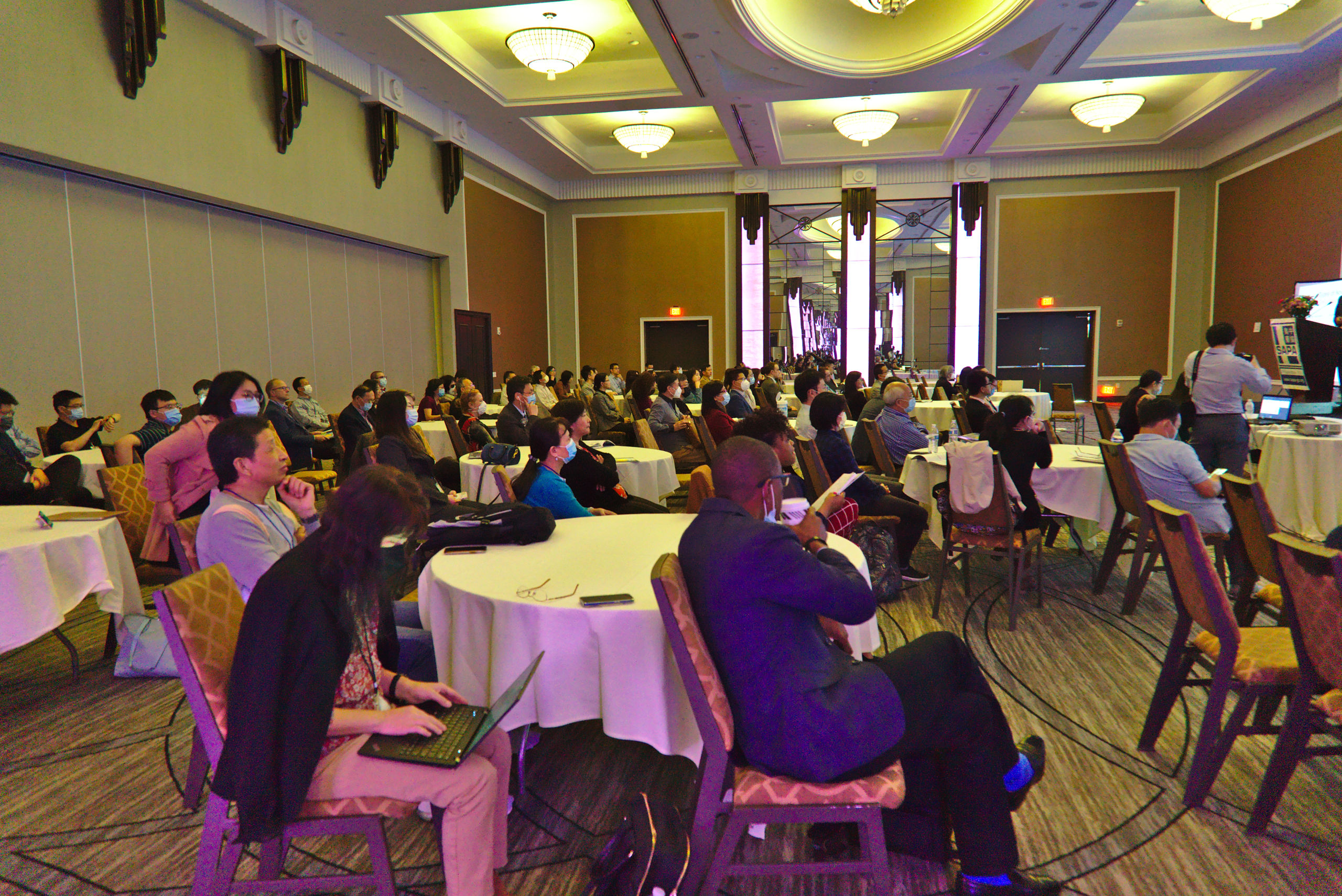
Afternoon, April 16, Scientific Track — Redefining Pharmaceutical Innovation: from Bench to Bedside


Dr. Alex Morozov is the Vice President & Head of Digital Health at Bristol Myers Squibb (BMS). He elaborated on how the applications of digital health influence the practice of medicine and its significant implications for drug development. Dr. Alex Morozov provided multiple examples, such as telehealth, to show that digital Health applications have been widely used in the clinical practice today, which would be a lot more common in the future. Dr. Alex Morozov identified a common goal in the fast development of digital health in clinical practices, i.e., increasing the interactions between healthcare providers and patients, so as to gain a better understanding of the patients’ conditions and improve patient outcomes. Nevertheless, the great benefits of the clinical application of digital health are not distributed evenly across the global population, due to the huge gap among different countries on healthcare infrastructure, which presents a major challenge in pursuing global health equity.
Dr. Vinay Parikn, a Psychology and Neuroscience Professor at Temple University, started his speech by elaborating on the current challenges and limitations in developing therapies for neuropsychiatric illnesses, where there is still huge unmet medical needs. He pointed out that one of the biggest challenges in this area is the especially low success rate in drug development for neuropsychiatric disorders, which is exacerbated by the high development cost and the lack of a good pre-clinical model.
Nevertheless, recent advances in digital medical have brought new hopes and opportunities in developing treatments for neuropsychiatric disorders, and one such advance is the digital companion. Noting that digital transformation in the pharmaceutical industry is inevitable, Dr. Vinary Parikn introduced the recent progress that digital companions achieved in the treatment of neuropsychiatric disorders. Dr. Vinary Parikn indicated that digital companions are fundamentally safe for use and regulatory approval is not required at present. However, as Dr.Vinay Parikn mentioned, more studies are needed to establish the efficacy of digital companions.
Dr. Jennings Xu, a director of Research and Development at Janssen, discussed how data science has driven the acceleration of J&J COVID-19 vaccine phase III clinical trial. The success of J&J COVID-19 vaccine development benefited from the use of a data model co-developed by researchers at MIT and Janssen. The model, called “DELPHI Model” or “MIT-Janssen Model,” provided essential guidance for J&J’s global vaccine development: it is able to predict upcoming hot spots of the COVID-19 pandemic. In this way, it enabled J&J to enroll nearly 60,000 human subjects within a relative short period of time in these hot spots and work with the local governments there earlier enough to better prepare for this largest phase III clinical trial of J&J COVID-19 vaccine. Dr. Jennings Xu stressed that DELPHI model is also applicable in settings other than COVID-19 and can provide great benefits to future clinical trials.
Afternoon, April 16, Business Track — Unleashing the Power from Scientific Breakthroughs and Entrepreneurship (Co-branding with BioKatalyst)
In a panel discussion hosted by Dr. Seamus Jiang, a Managing Director at PwC US, four panelists discussed critical issues encountered by a growth stage innovator company in the biopharma space.
Dr. Yuhang Zhao is a Senior Adviser at China Grand Enterprises. She stressed that time is the most important value-driver for biopharma innovations and, as such, it is better for a research project to fail fast and early. Dr. Yuhang Zhao believed that developing me-too drugs is actually a riskier business: even if the me-too drug finally gets to the market after a normal round of R&D process, it could face more peer competitors and even be outcompeted by a newer generation of therapies. Dr. Yuhang Zhao also pointed out that FDA is the first gate to success for a drug developer, and what FDA needs is not more data but the right data.
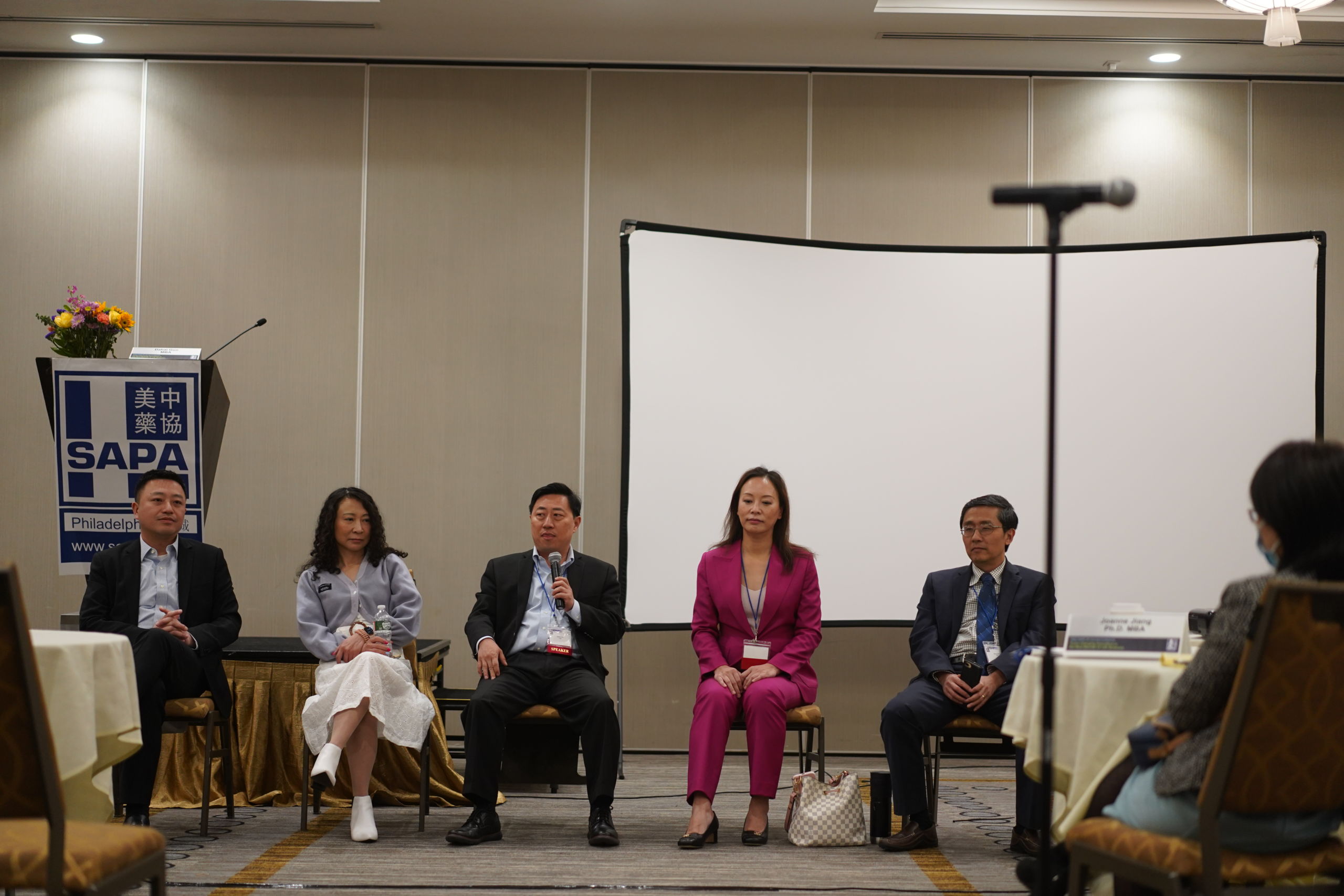
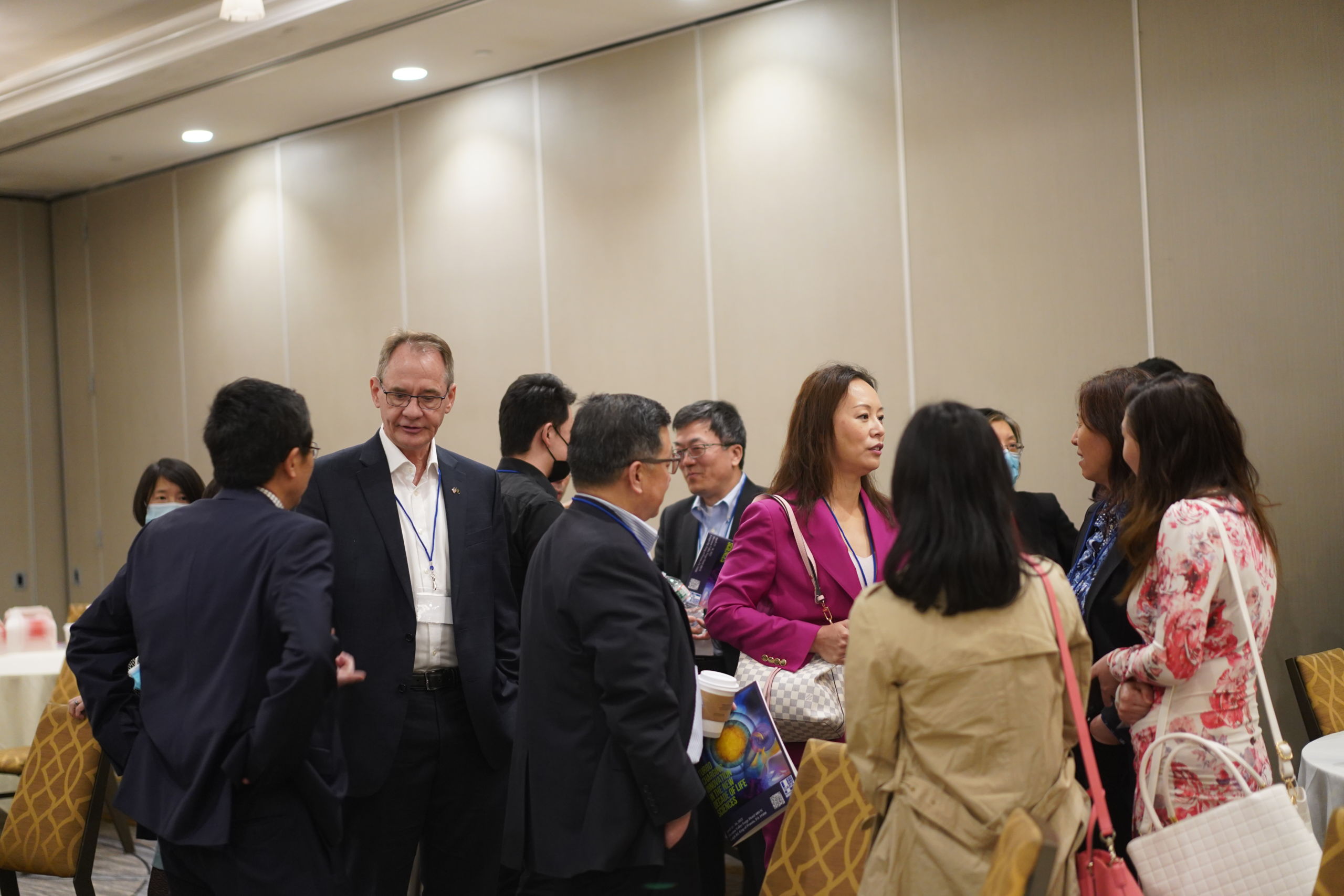
Dr. Jimmy Hao is a partner at Fox Rothschild LLP, specialized in patent prosecution and litigation. Taking the perspective of a biopharma innovator company, he identified and analyzed six dimensions of intellectual property: type; scope; strength; number; location; and time. With that, he offered critical insights in the process of establishing and developing patent portfolio by a biopharma innovator company.
Dr. Joanne Jiang, CEO of LeaderMed Group, introduced the unique business model of her company as a CRO. First, a whole portfolio approach is taken to monitor and develop projects in specific disease areas. Second, the portfolio is de-risked by killing projects early when they show little chance of success. Third, the CRO focuses on research development in Asia, aiming to make Asia the R&D center.
Mr. Dahai Guo, now Chairman and CEO of Zennova Pharma, has rich experience in commercial development in multiple industries. He offered his insights of drug development with the aim of commercial success. Mr. Dahai Guo noted that most successes he sees (such as obtaining market approval) are only one-stage, as opposed to, long-term successes, because the real success lies in maintaining competitive advantage in the long run. As such, in face of competition, one should never regard his or her product as the best in the market, even if it indeed is at the moment. He stressed that the biopharma industry is not special, to which same principles of sales and marketing stilly apply, and best science does not necessarily mean best business.
Afternoon, April 16, Career Track — Do you need an executive coach?
The career development session was hosted by Dr. David Cragin from Merck. Ms. Marie Leithauser, the featured speaker, is an executive coach with 20 years of experience as a senior leader in Bio-Pharmaceutical R&D. She first introduced the definition of executive coaching and what is in it for your career development. In the following breakout session, onsite audiences were able to try out the principles immediately, by asking a few short questions in turns and building business relationships with random matched partner. Dr. Cragin then lead a practice session of elevator speech on how to tailor your pitch to your audience and provided a coaching demonstration with a volunteer Luna Li, who is the Bussiness Development Manager at Frontage Laboratories.
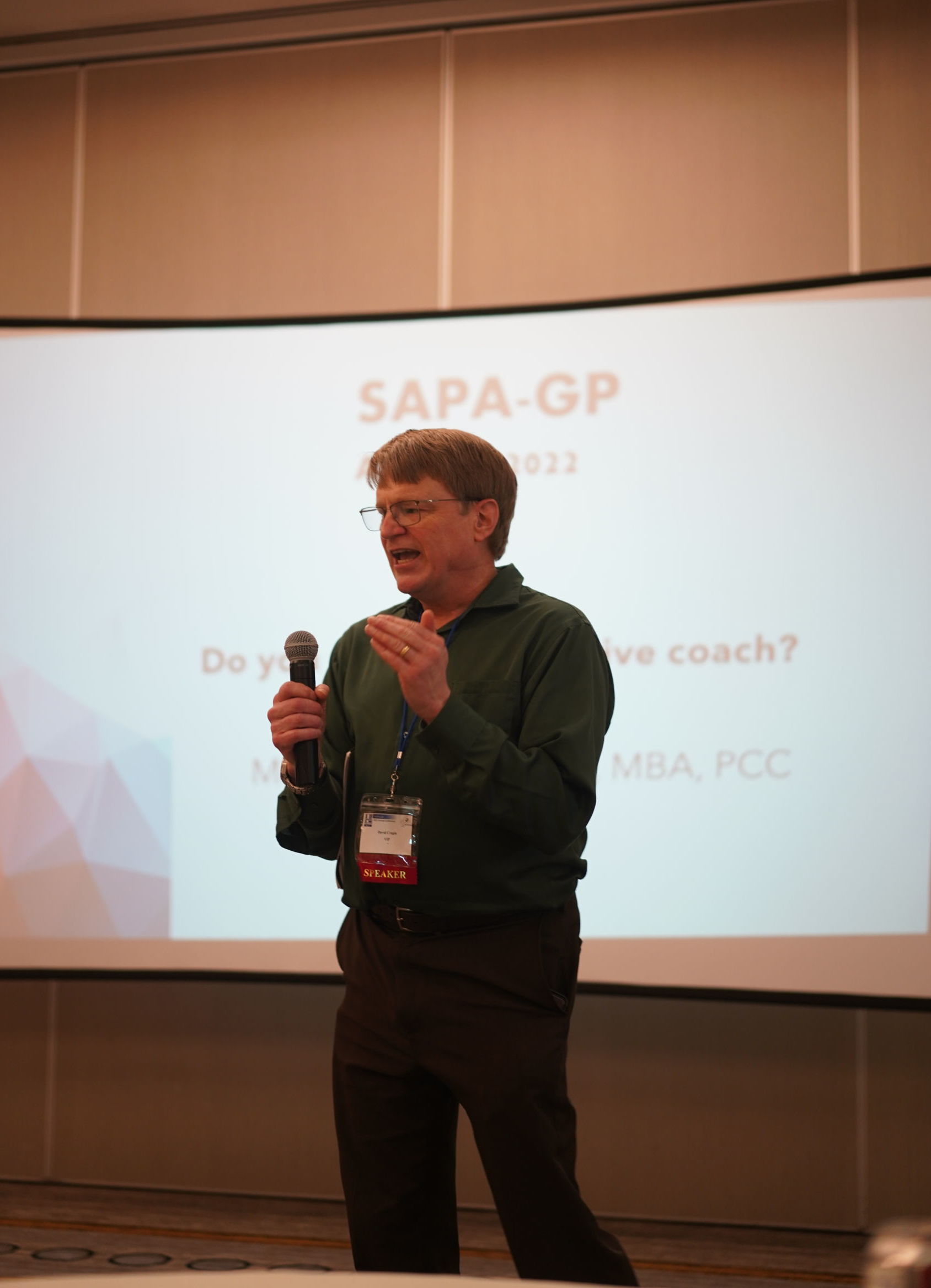
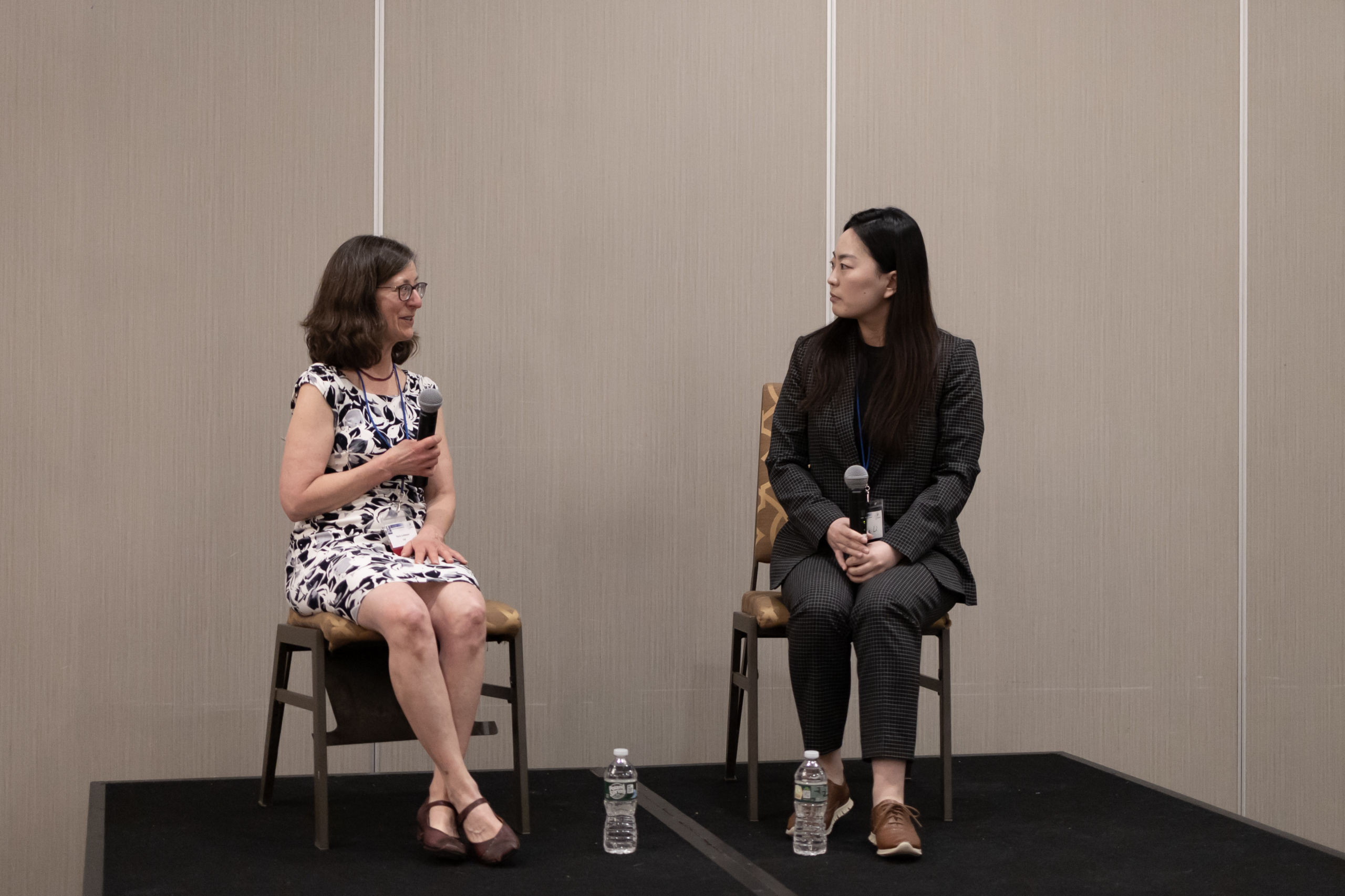
Networking and Reception:
During the one and half day session breaks and afternoon networking reception, hundreds of attendees were enjoying the first onsite professional get-together in three years. Speakers, sponsors, business and academic representatives, and students continued having lively discussion on talent recruitment, reaching out to potential business partners, and company branding and exhibition.
SAPA-GP Leadership and Volunteer Awards & Closing Remarks
Dr. Yongchao Su (2021-2022 President) gave the closing remarks and hosted the award ceremony to advisory board, functional leads and volunteers with special contributions to SAPA-GP over the past years. The new year presidency was then handed over to Dr. Haichen Yang (2022-2023 President). The annual conference came to a successful end in Dr. Haichen Yang’s speech:
“...The year of 2022 is a year of recovery. We are recovering from the depth of pandemic impact, and we are regaining our lost ground. But this is also a year of celebration. We are so proud to celebrate the successes of this great organization during the past 20 years. And the most important of all, I believe this will be a year of thriving. We want to take this organization to a brand-new level. We aim for increasing our visibility, expanding our tent, and becoming an important player in the broader and diverse communities of the greater Philadelphia...”


